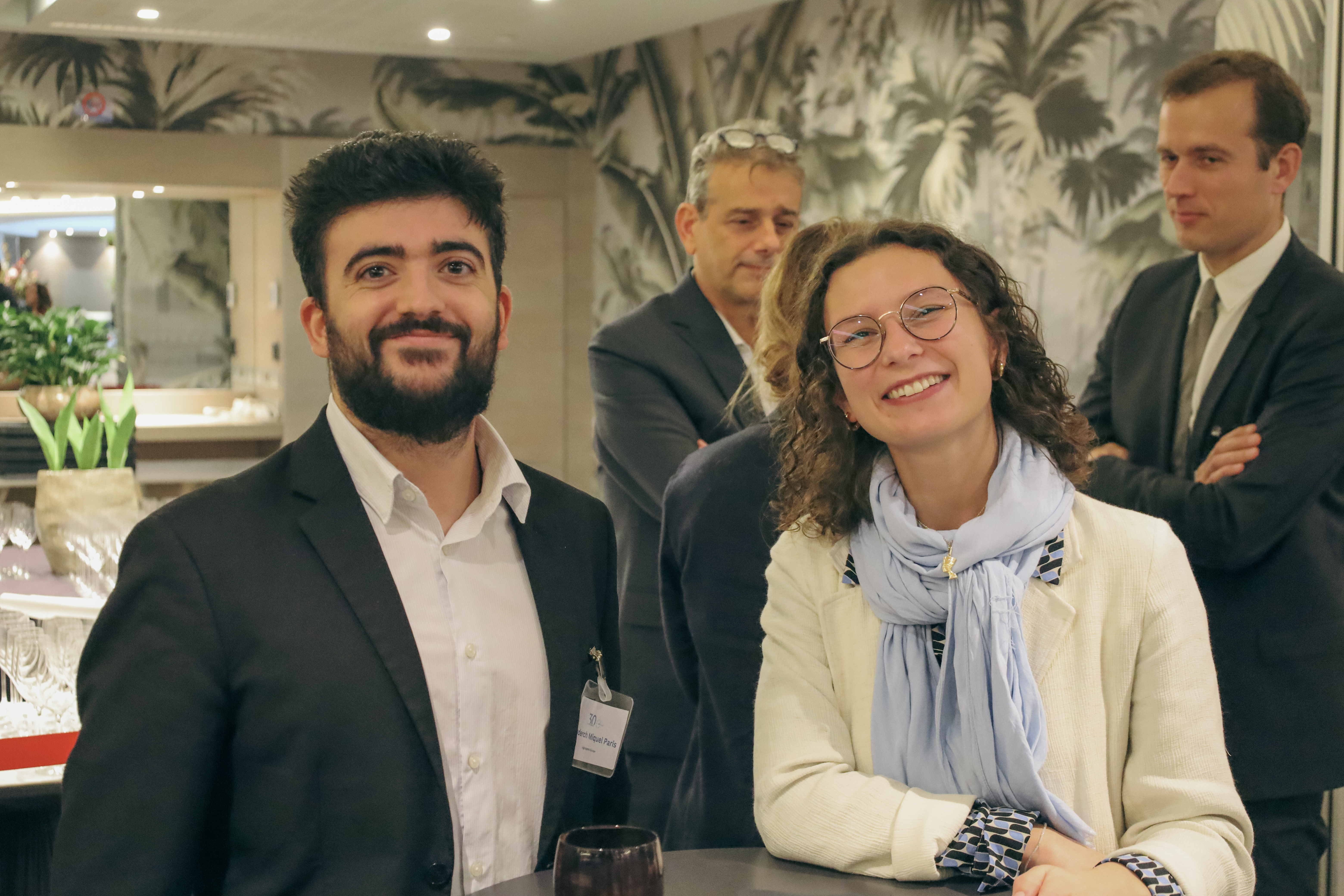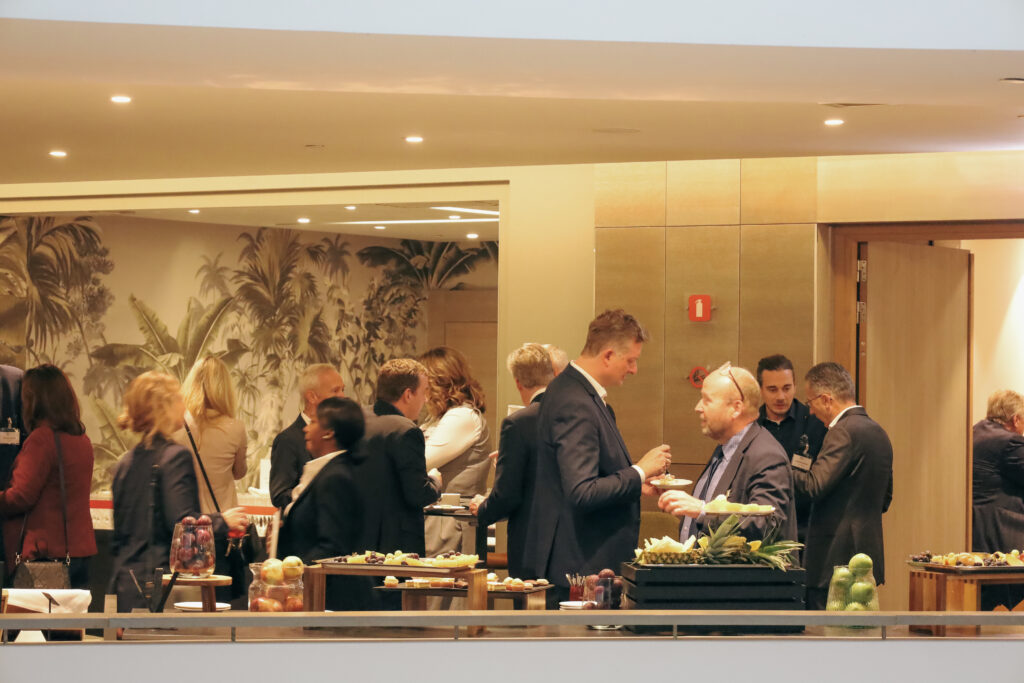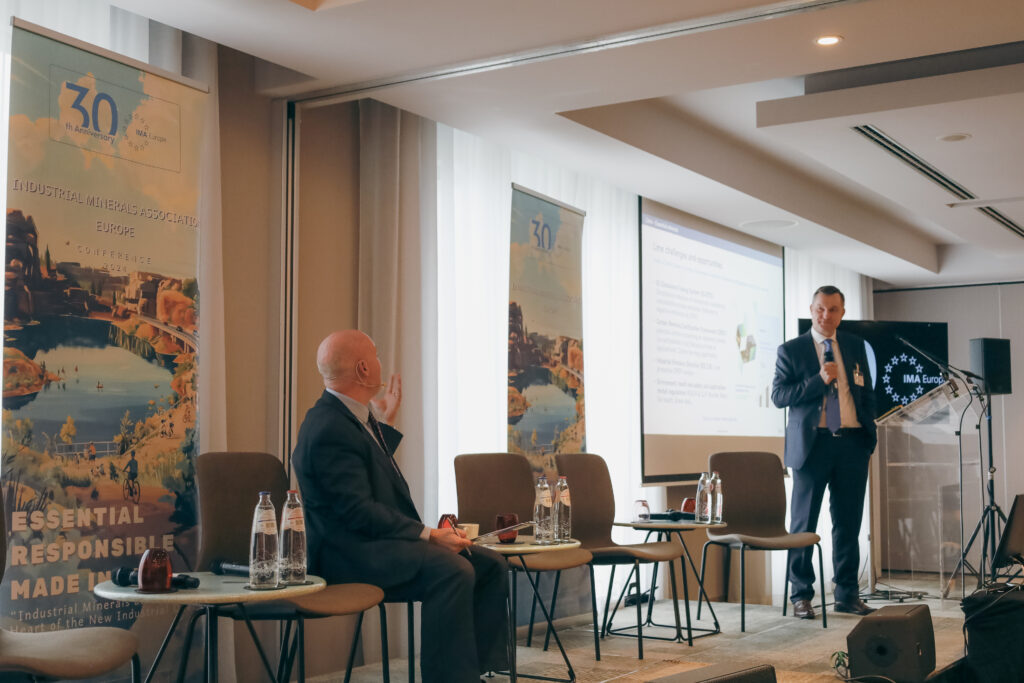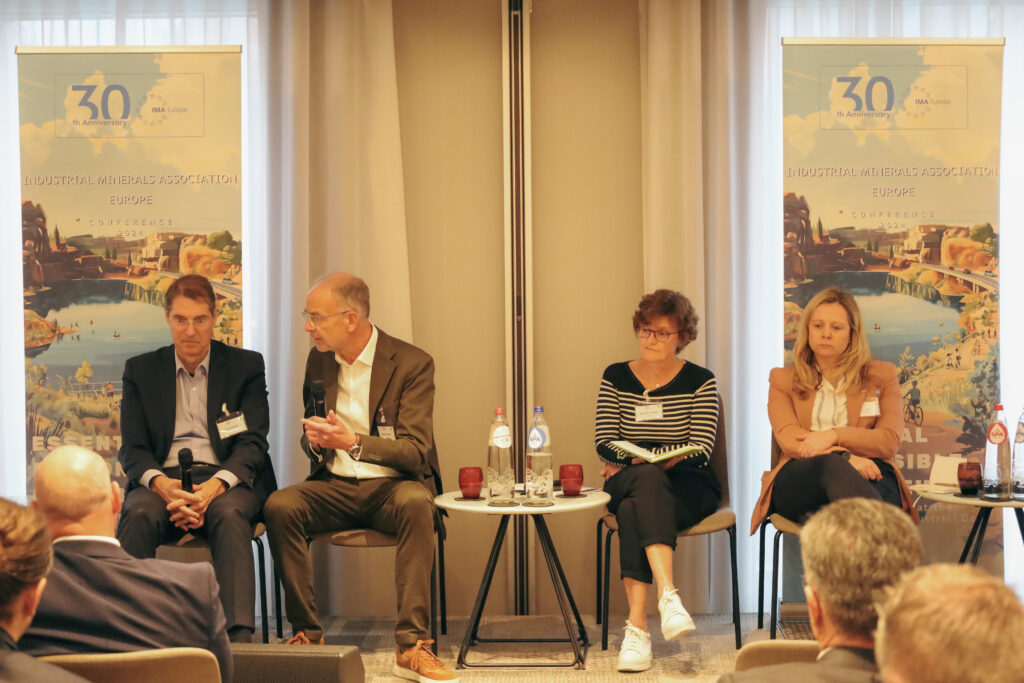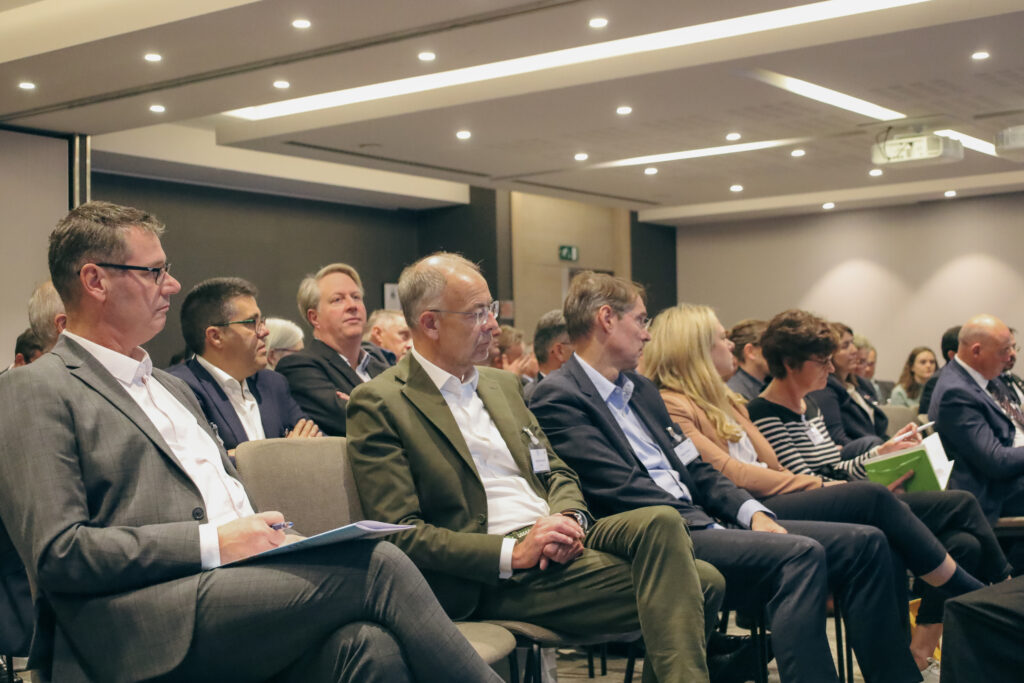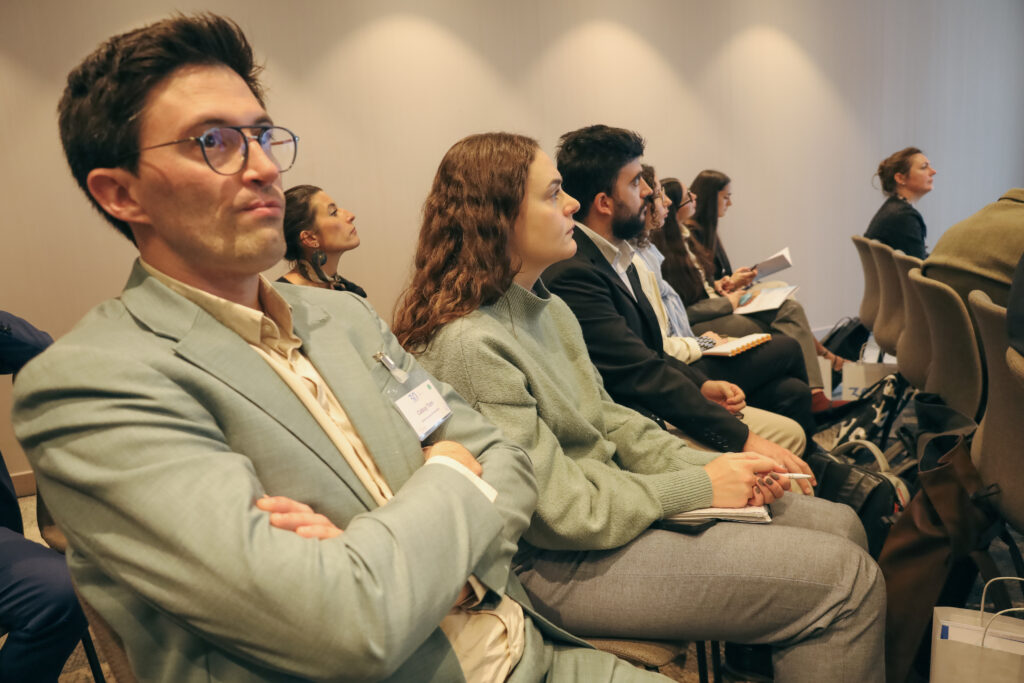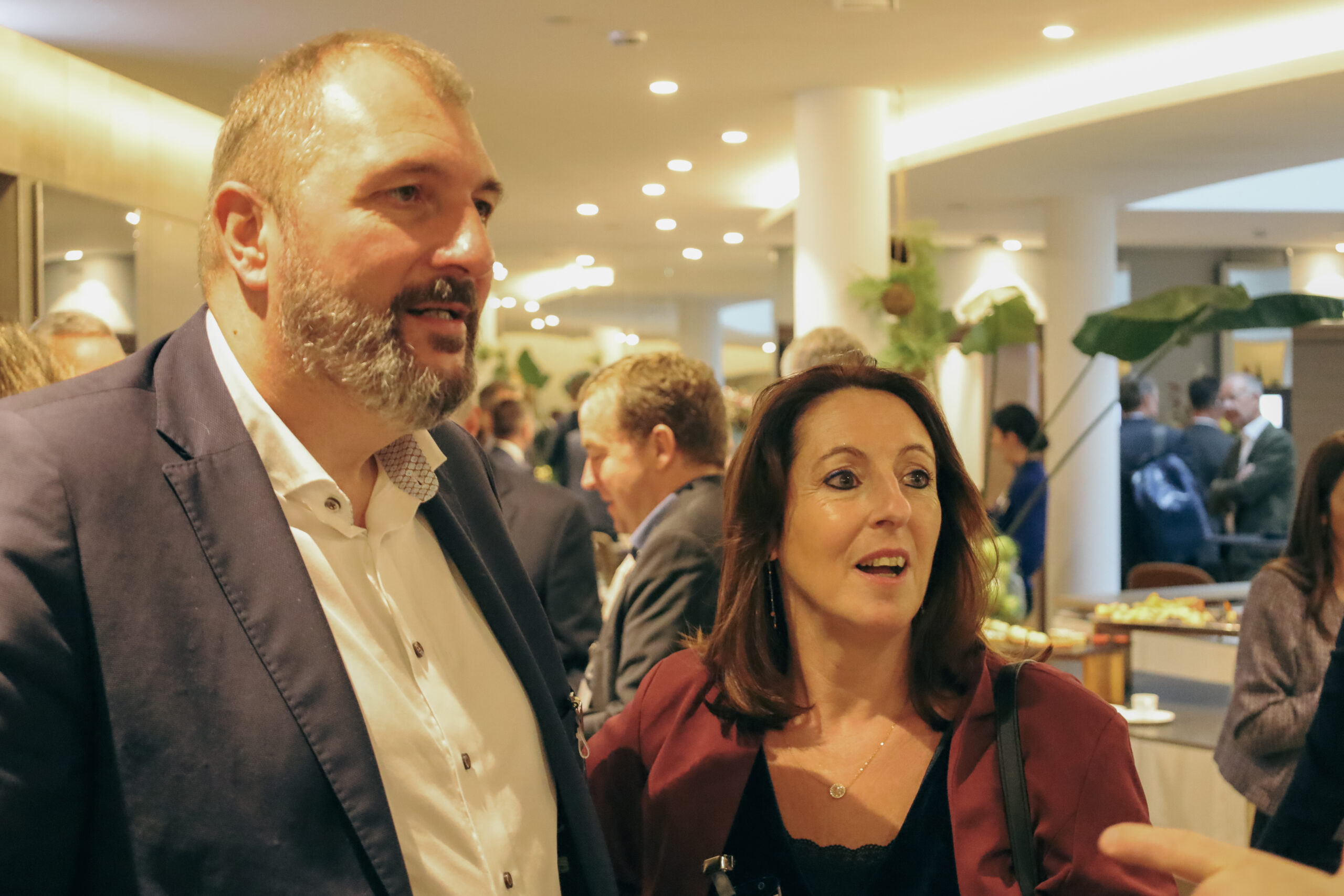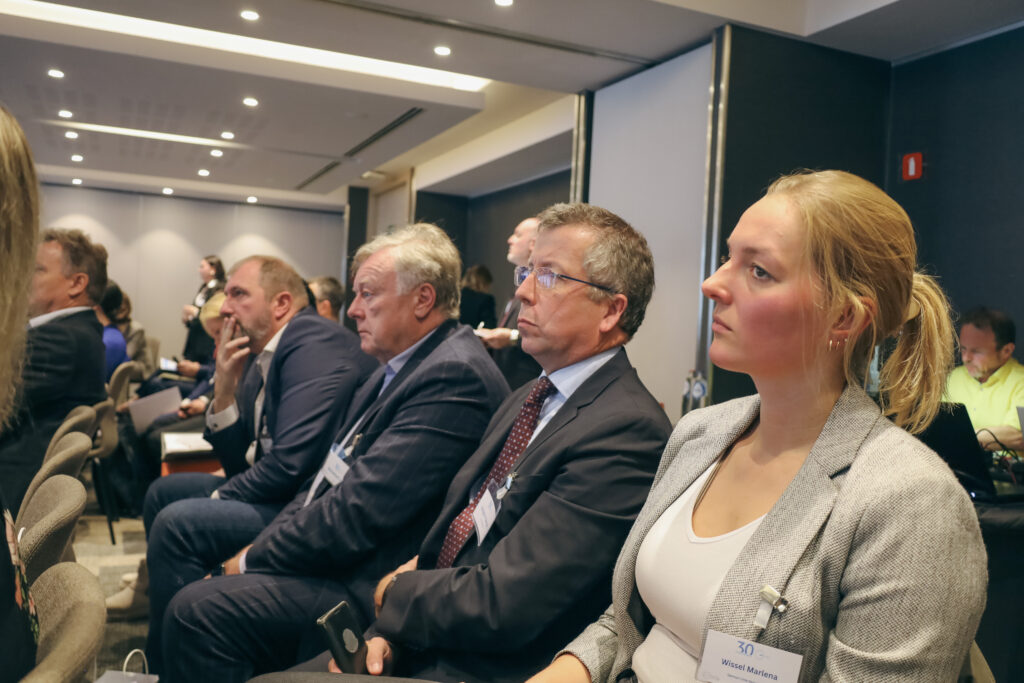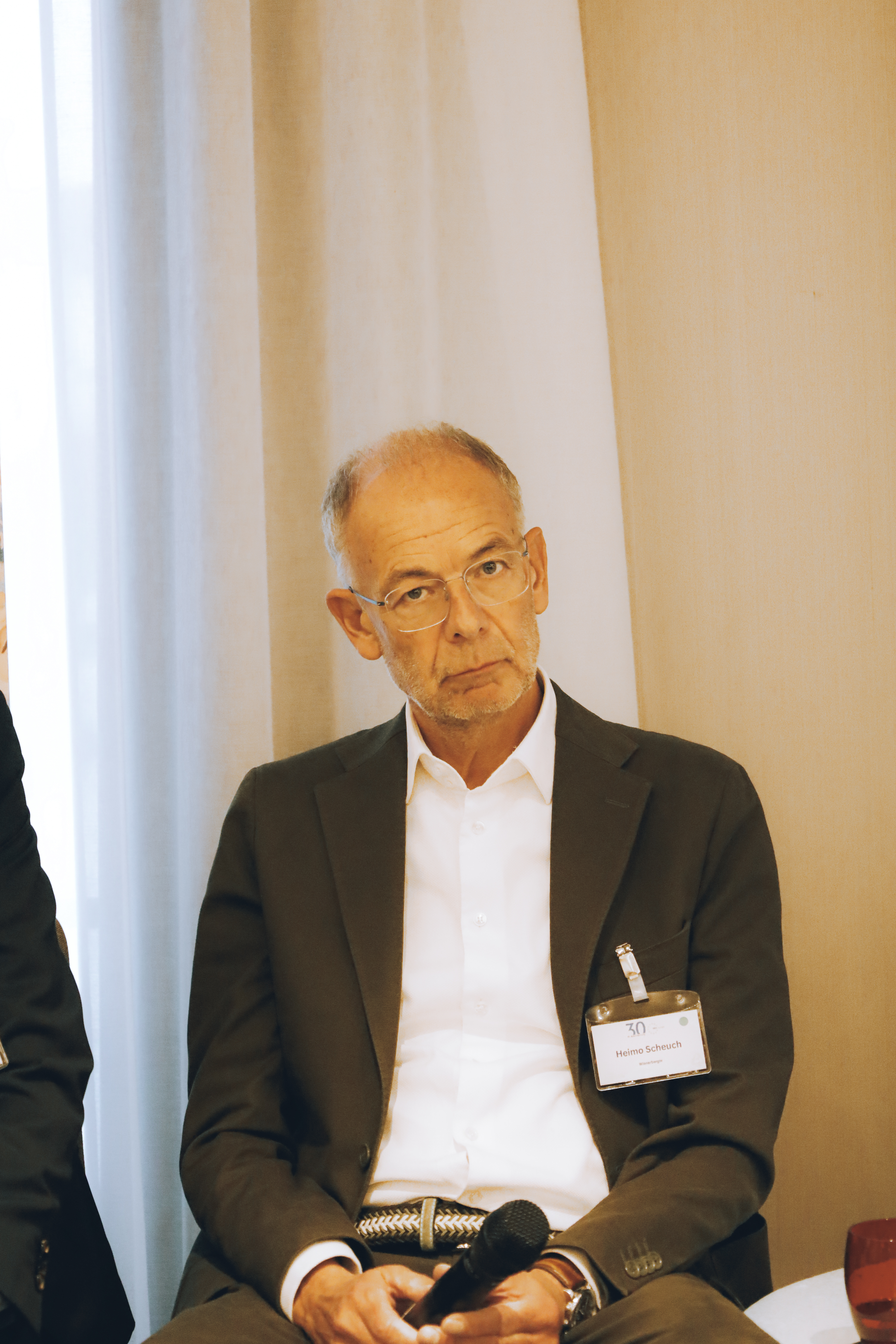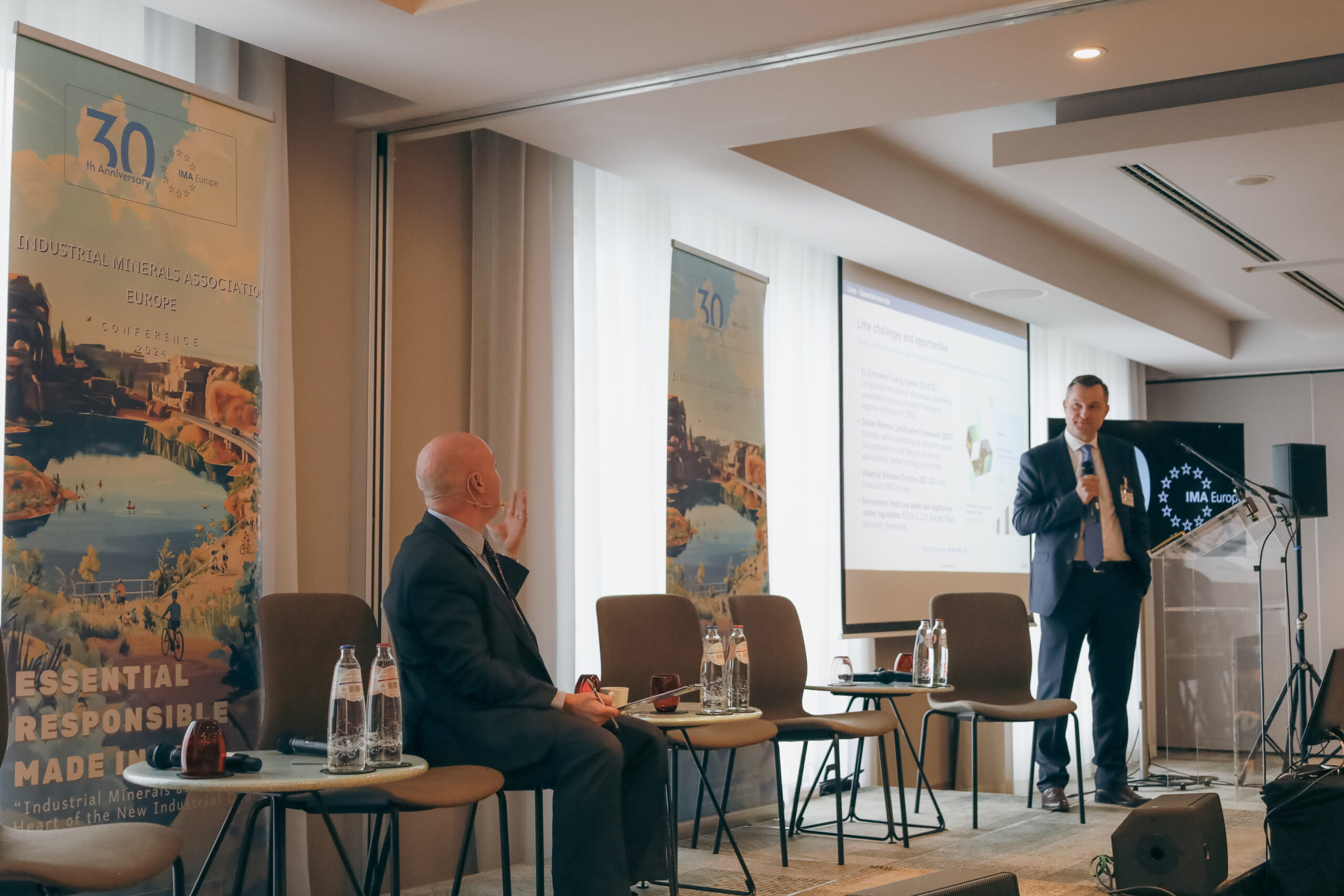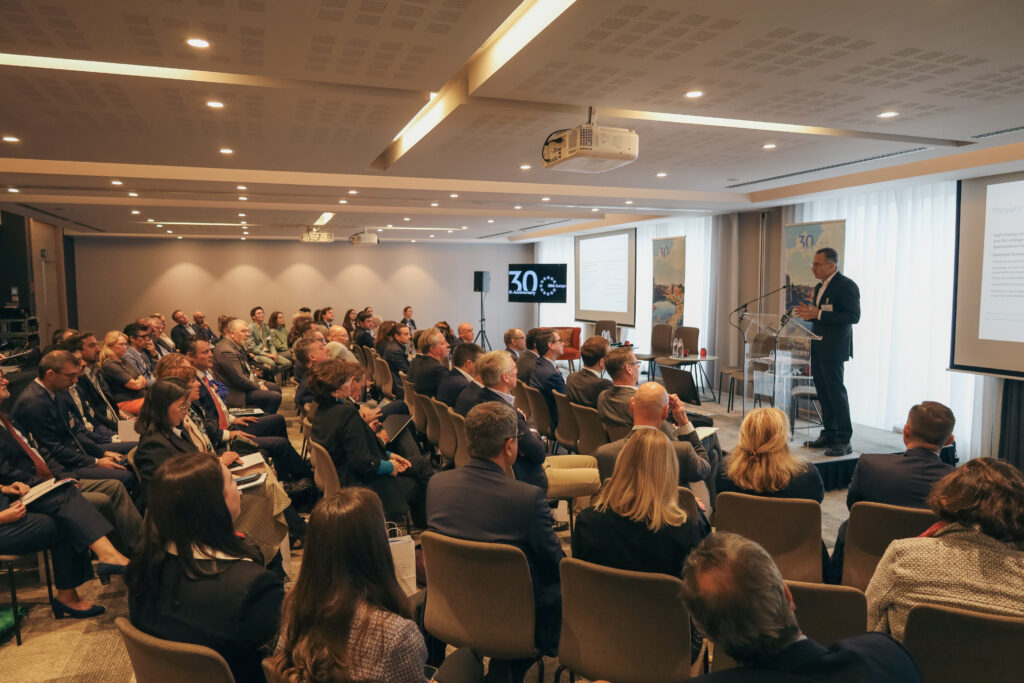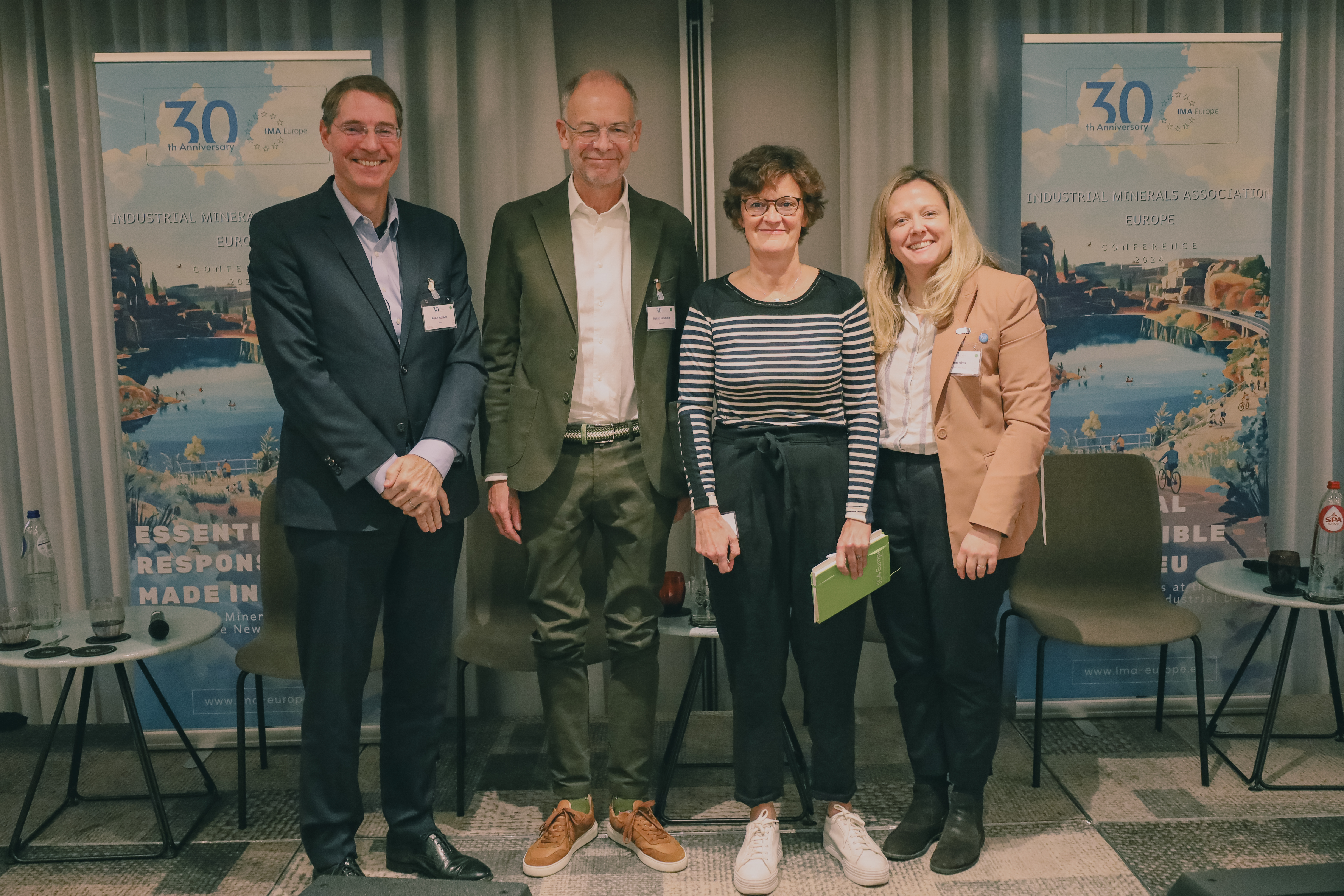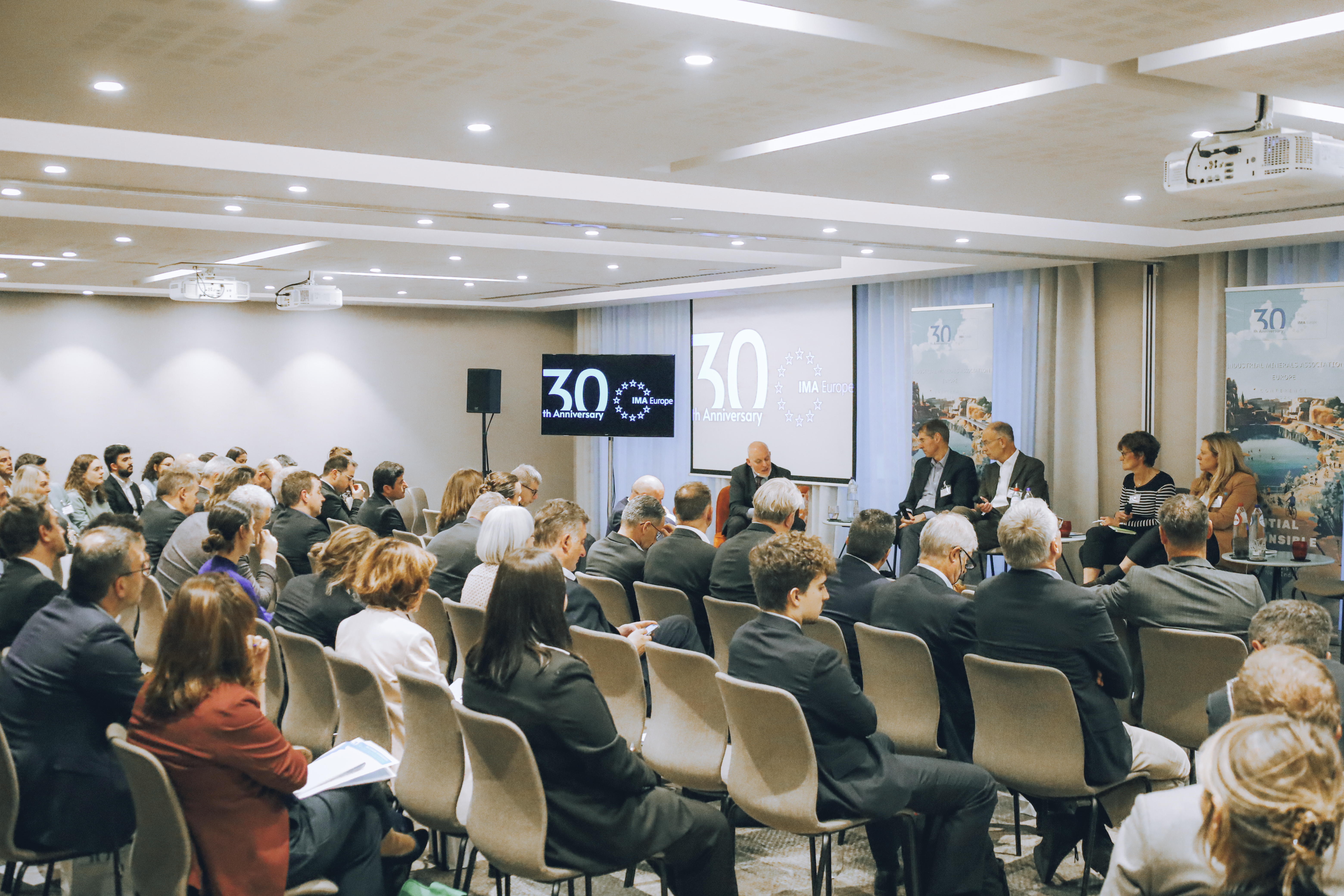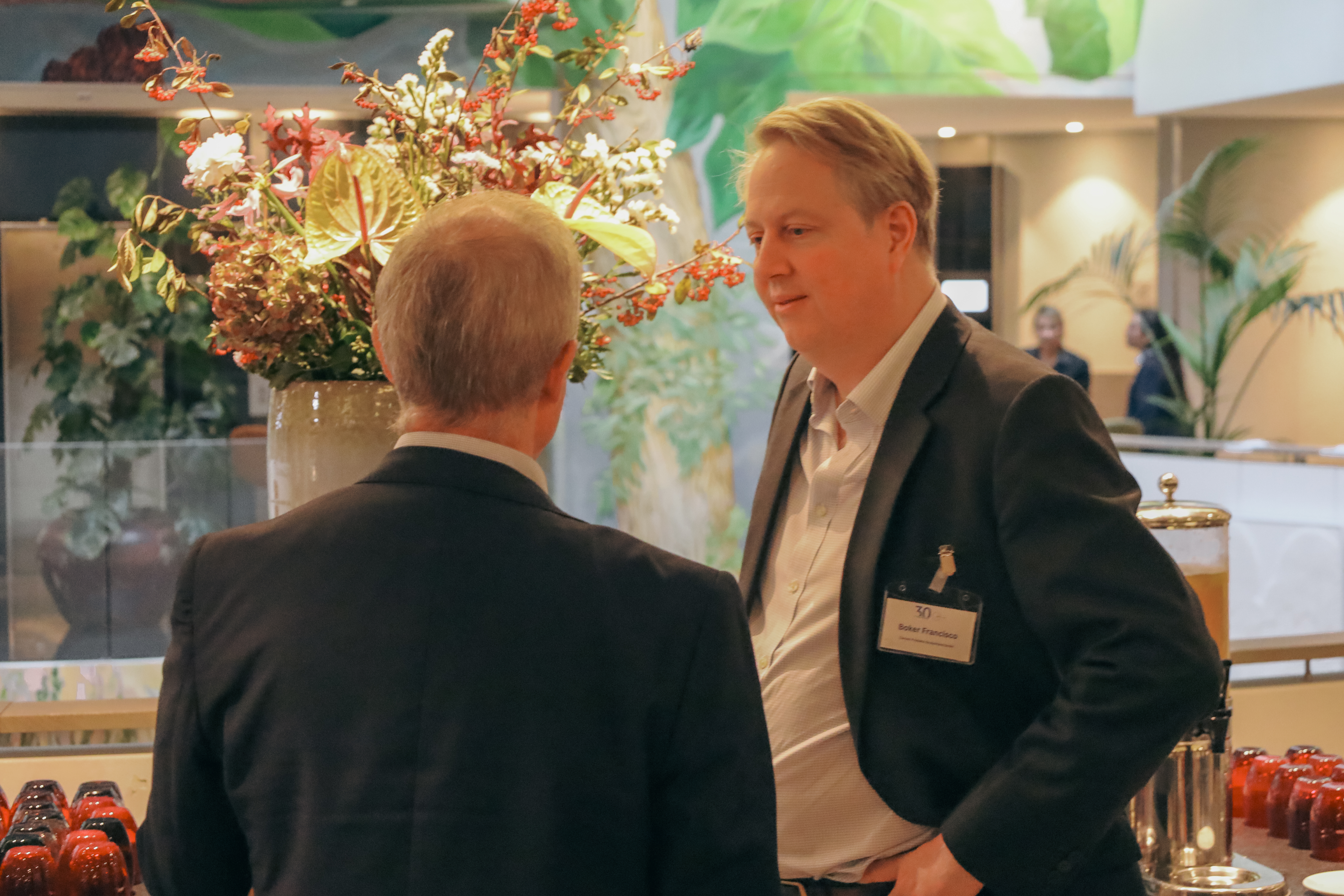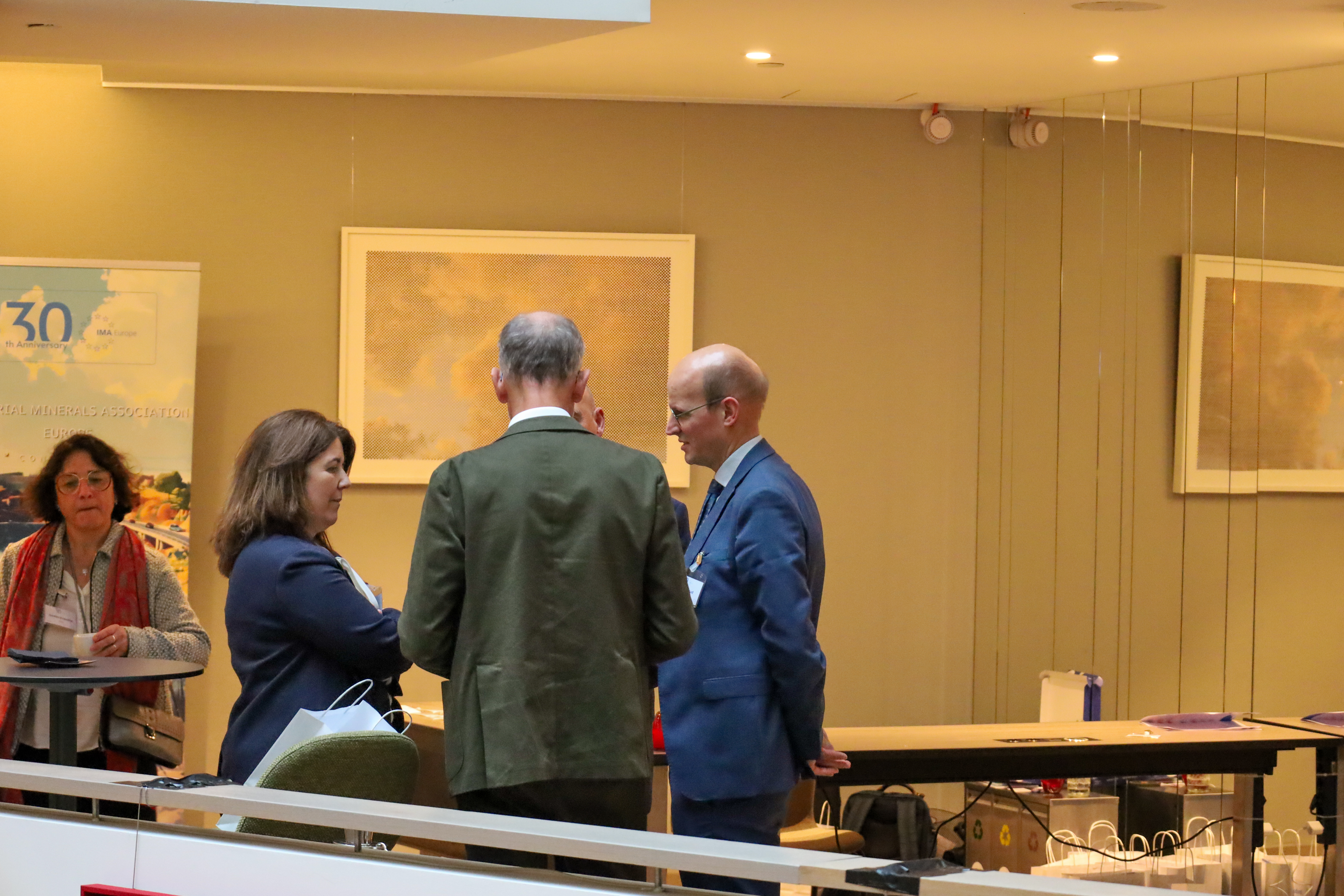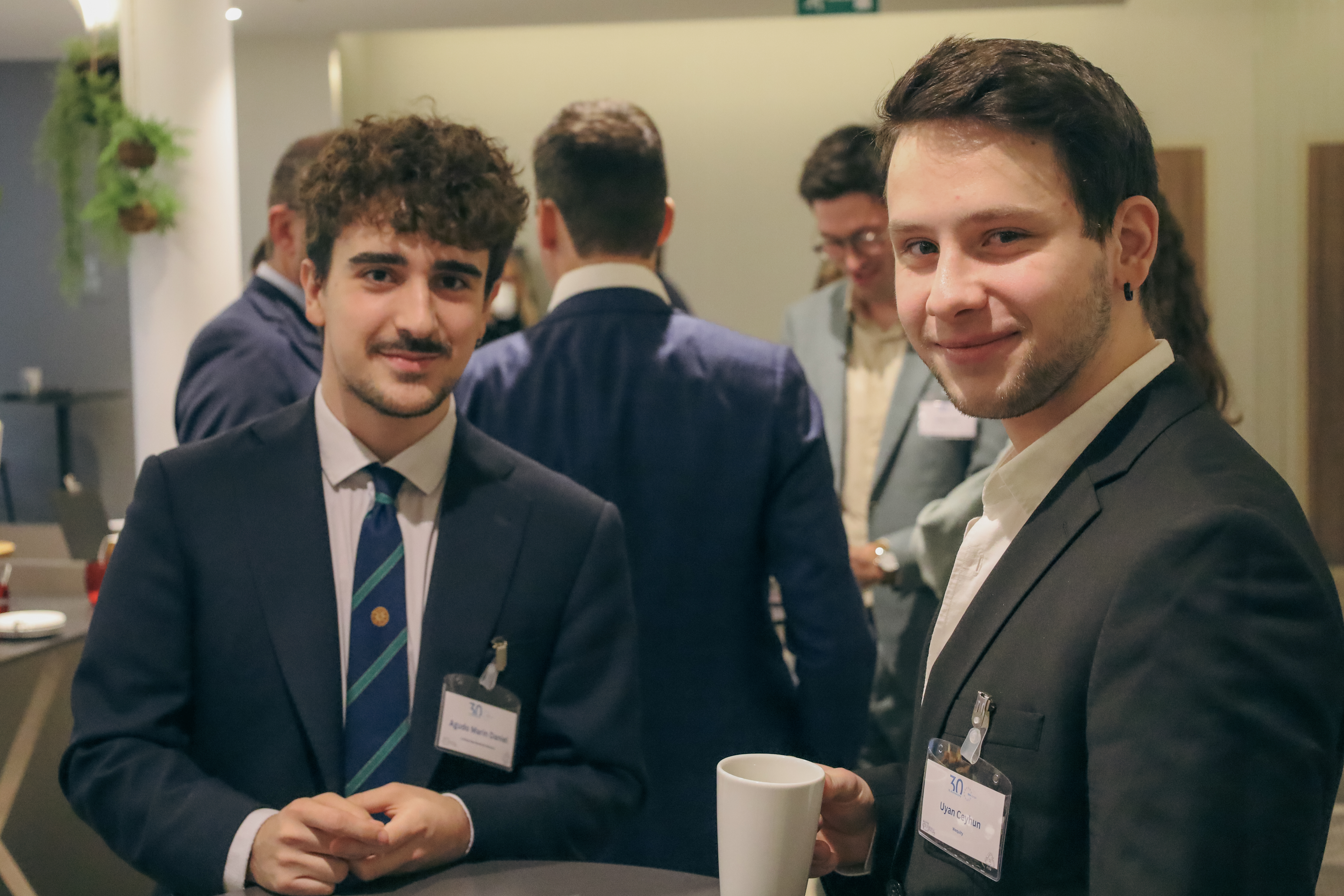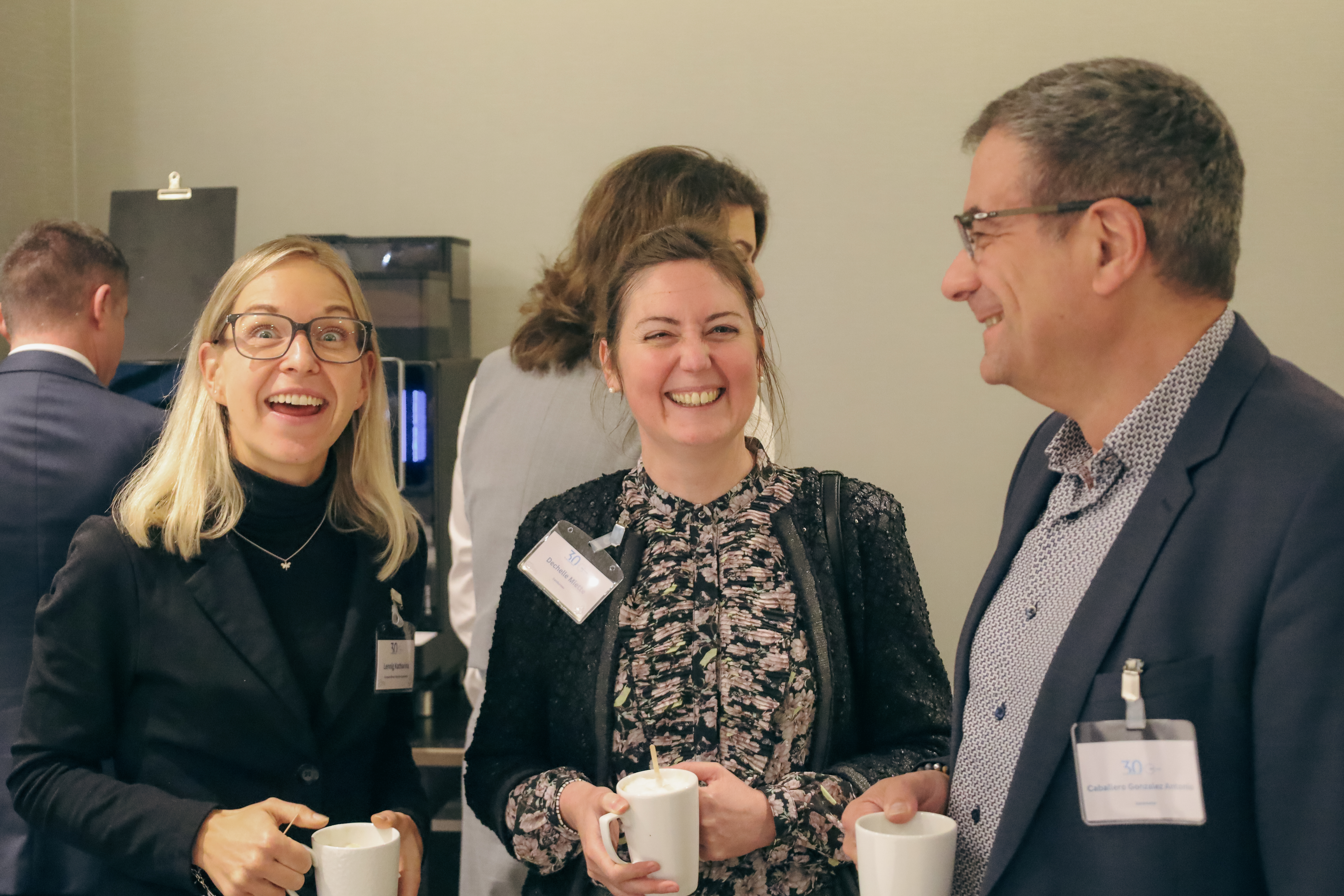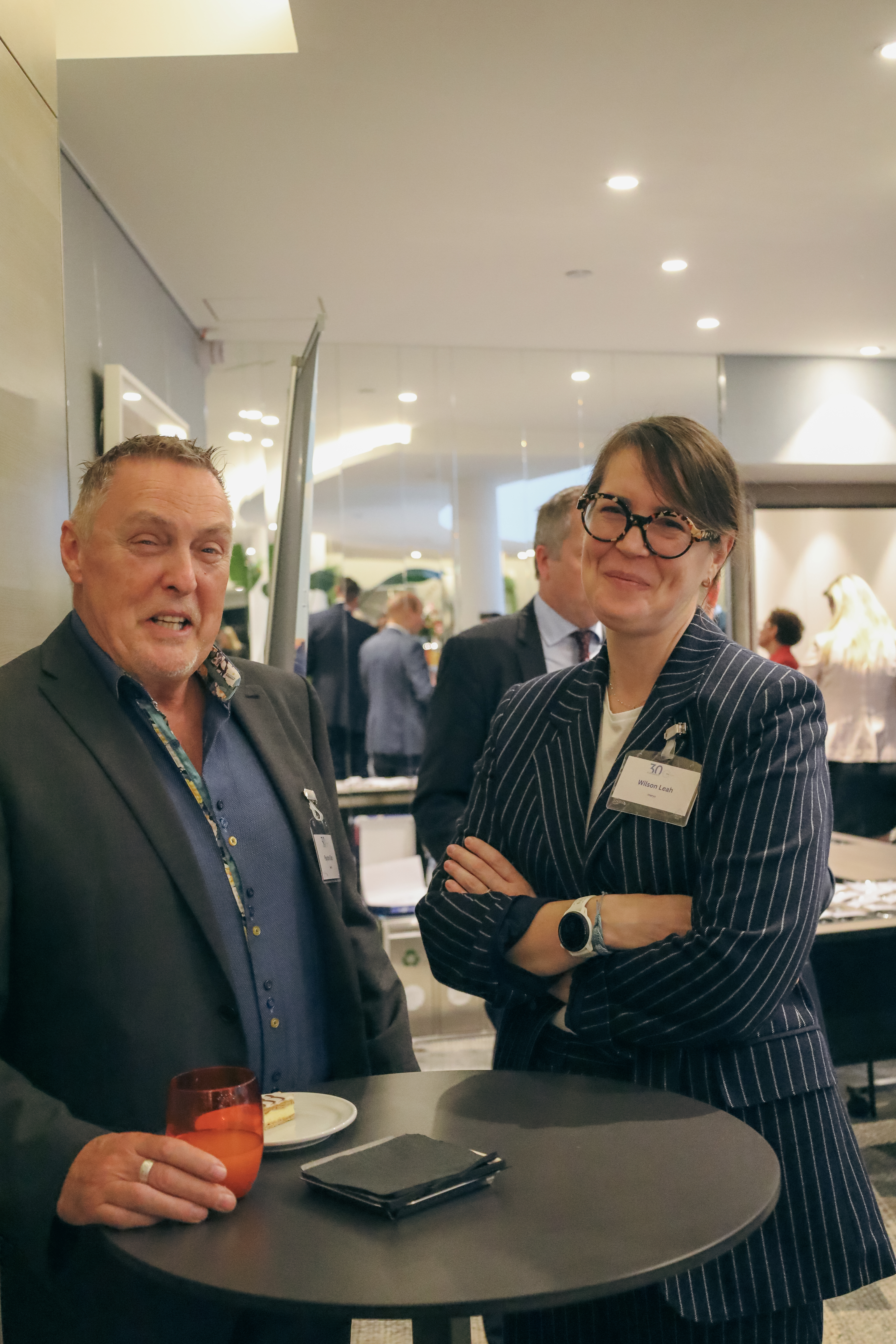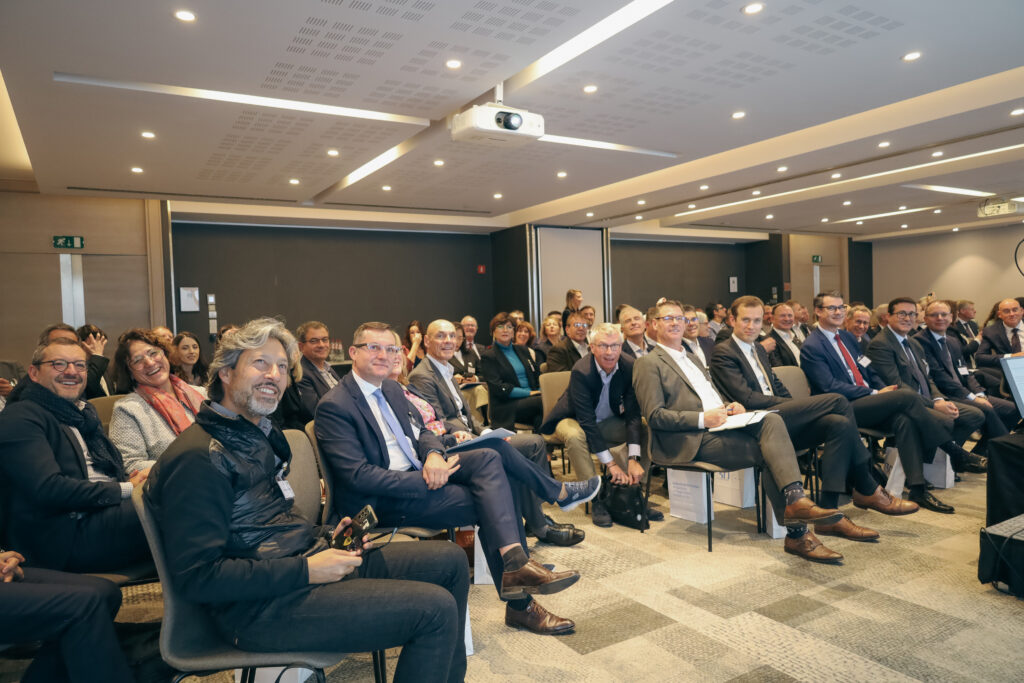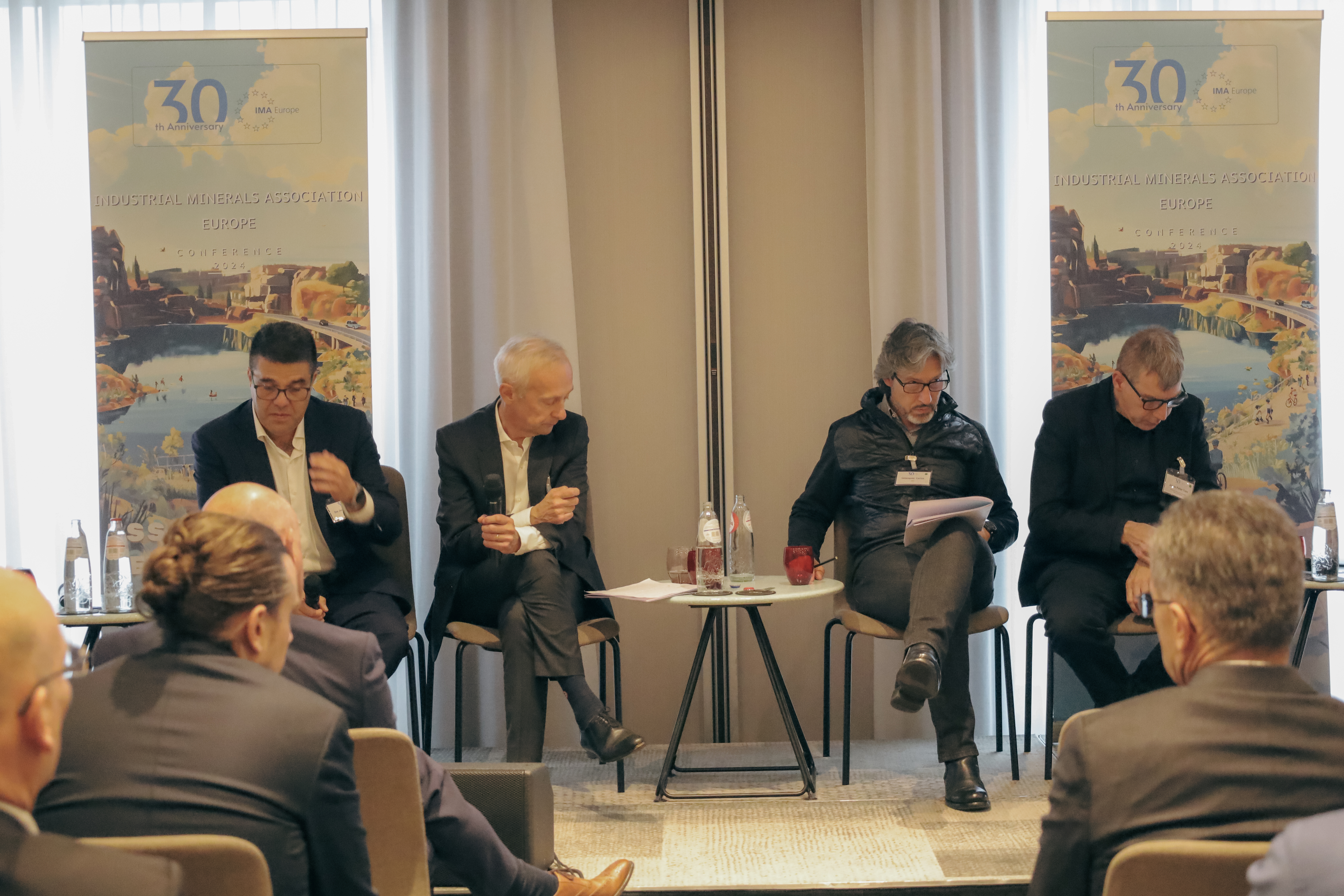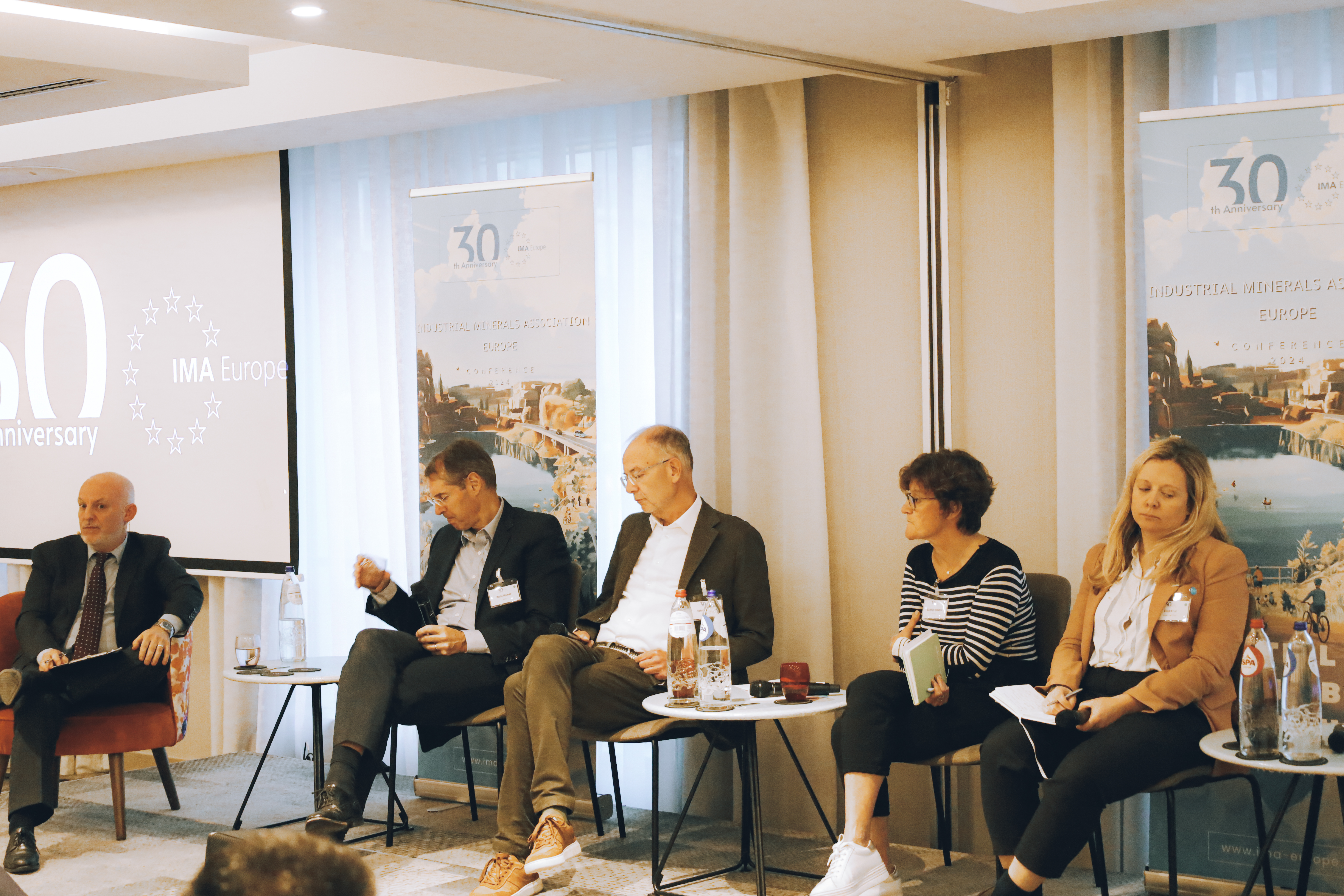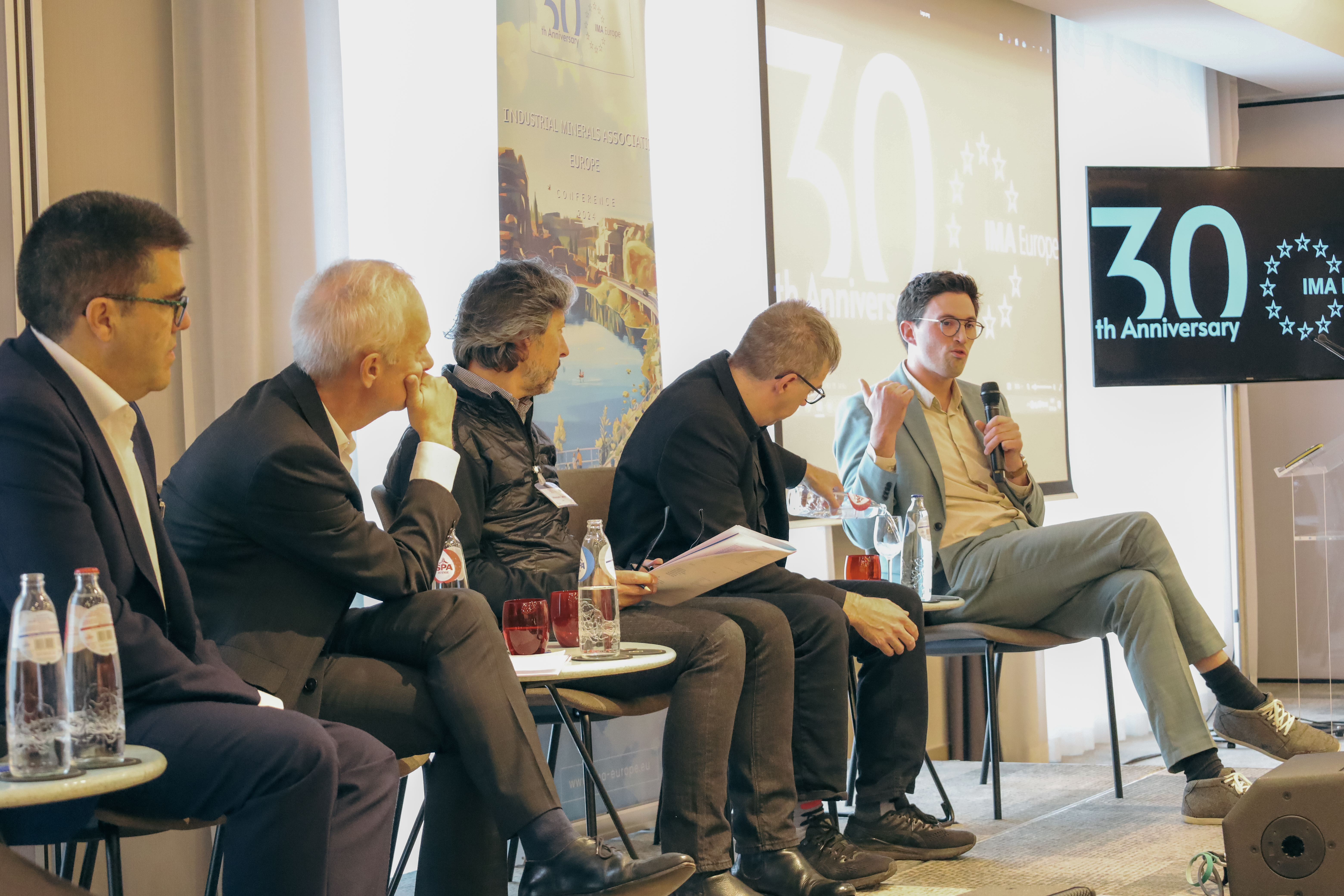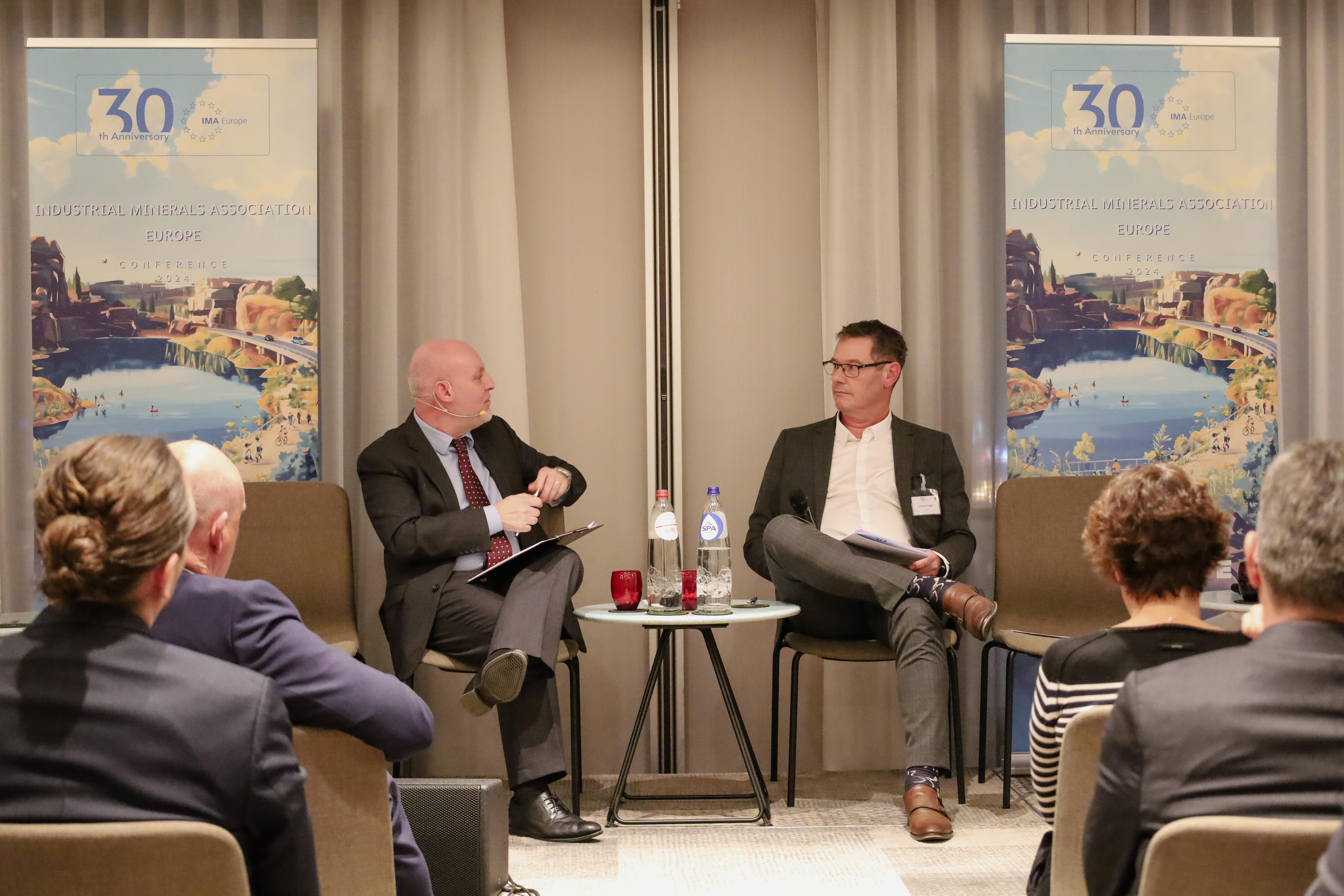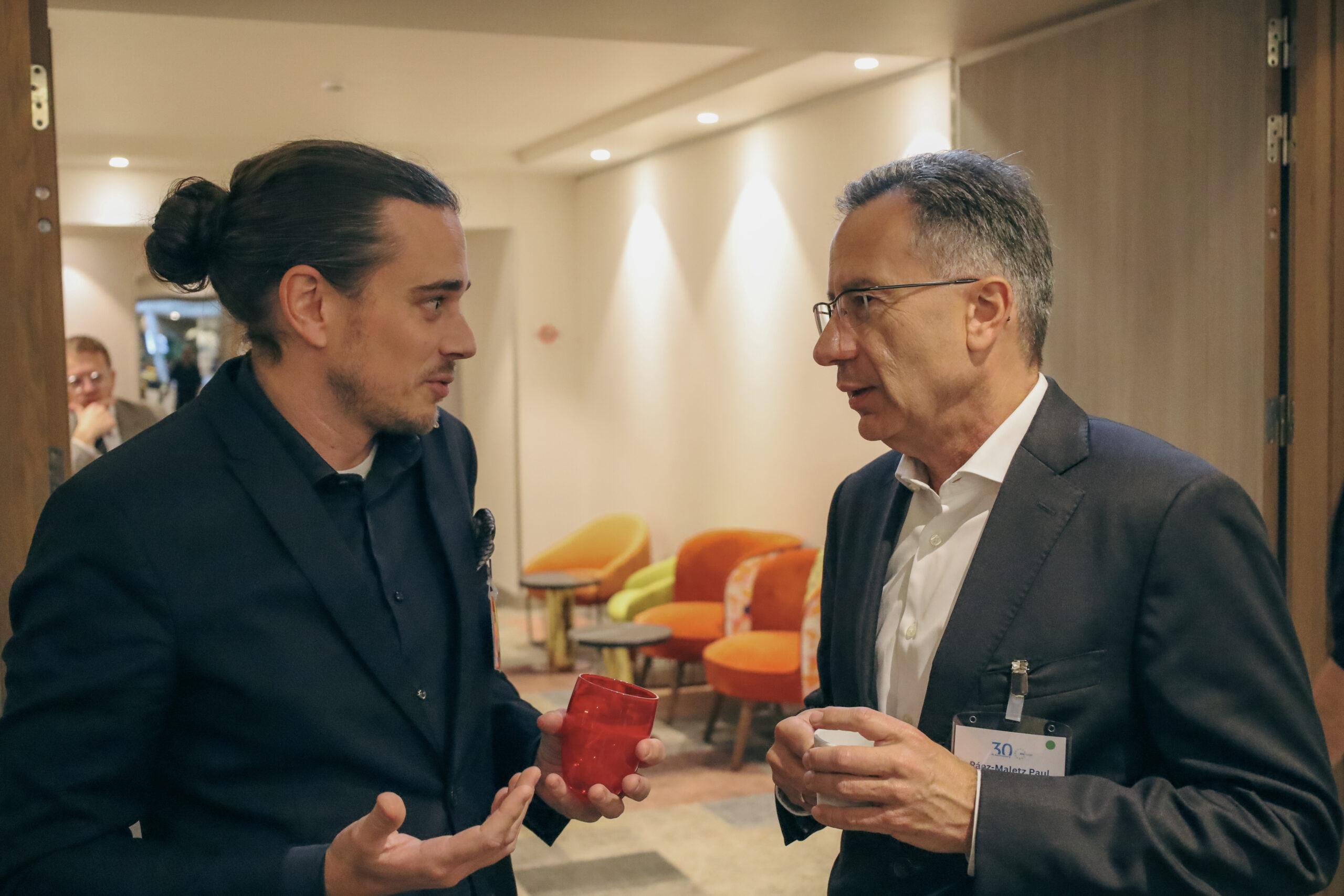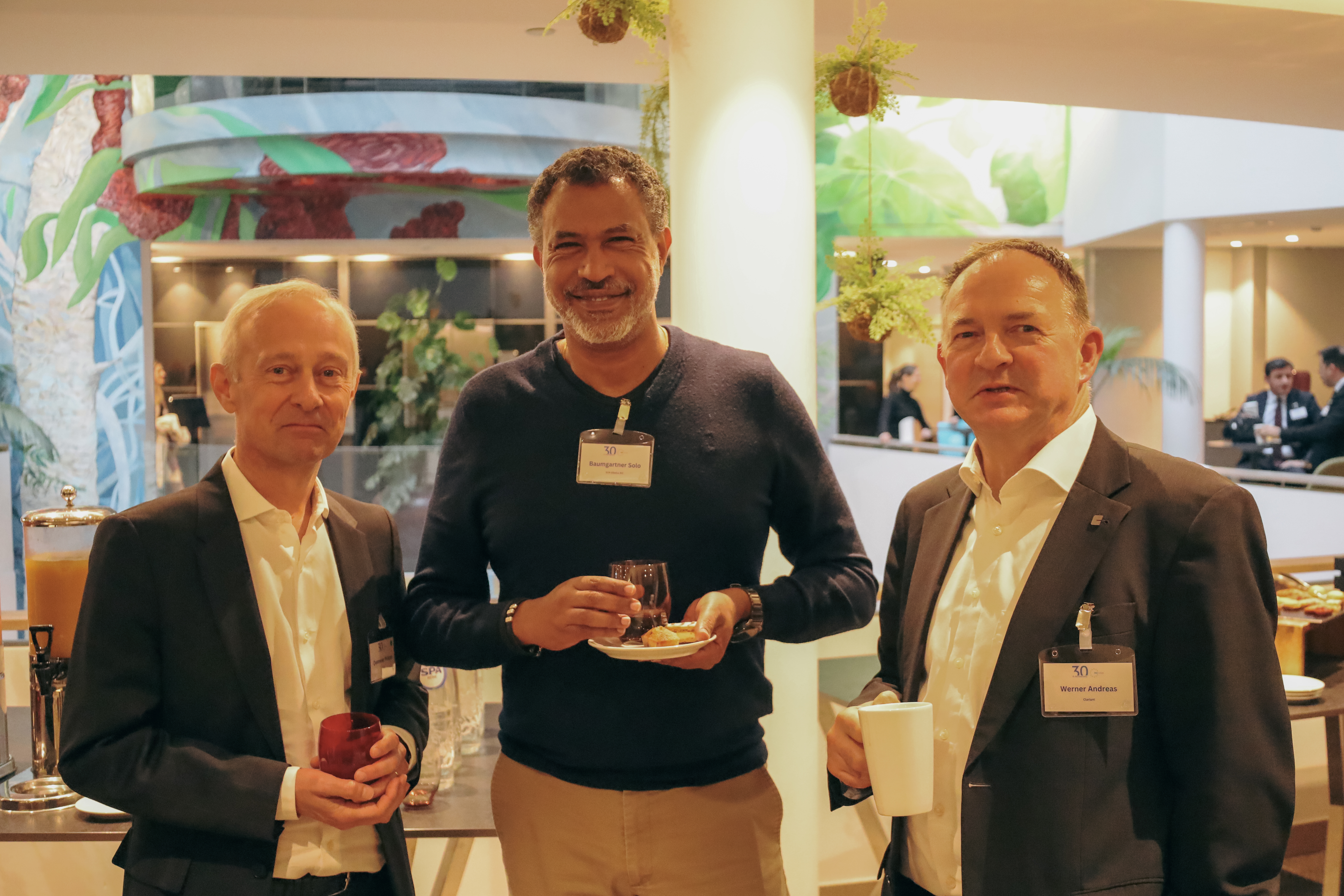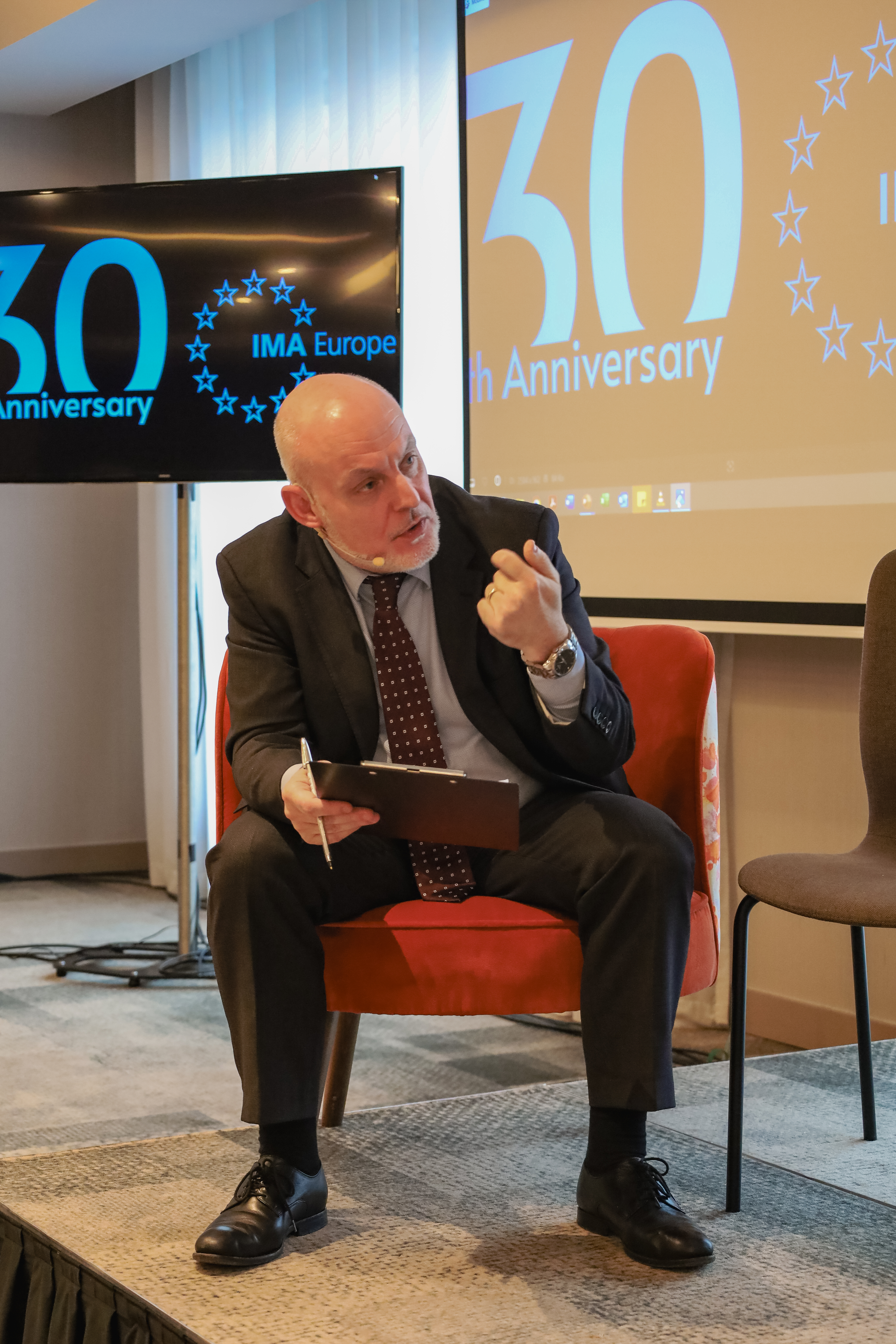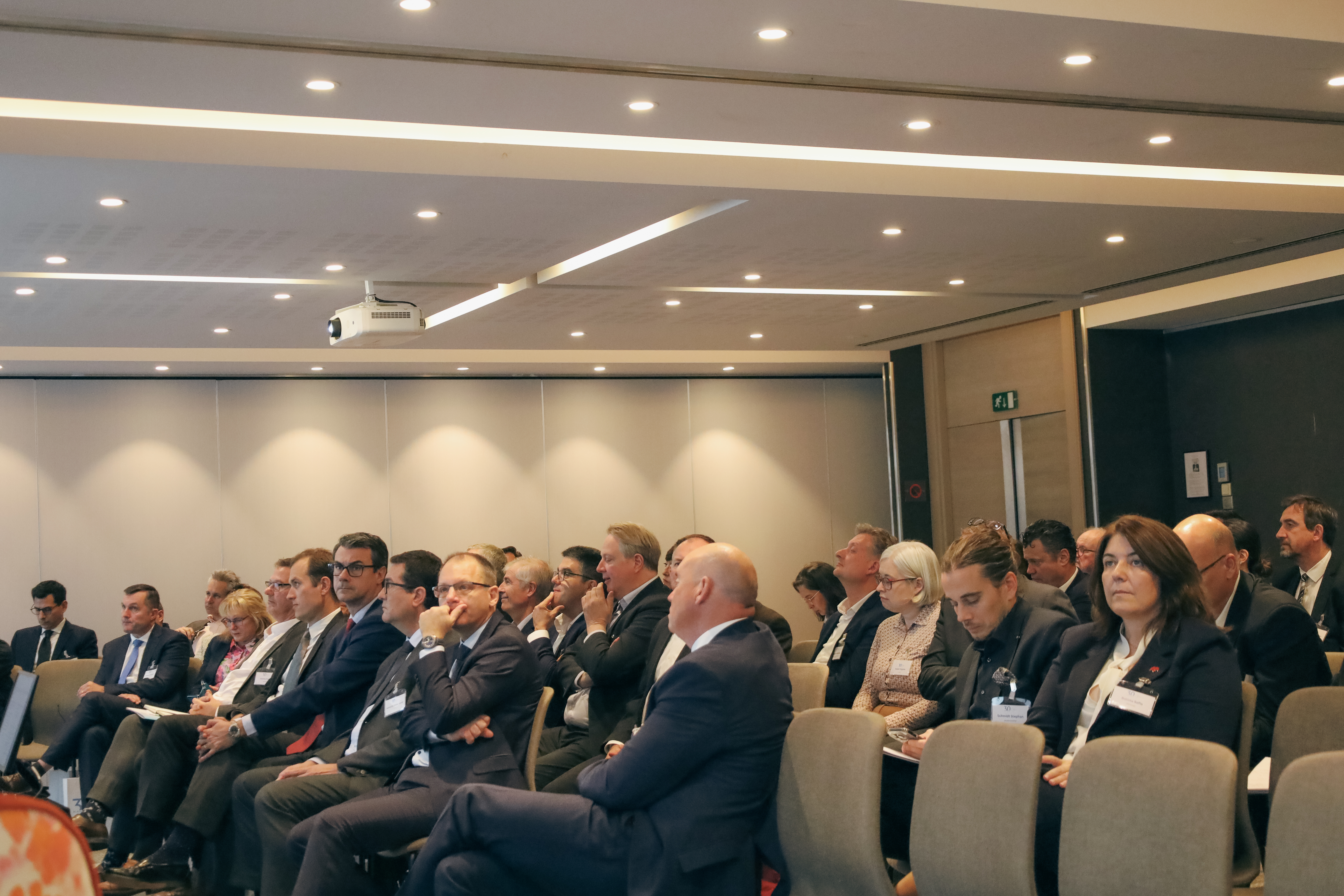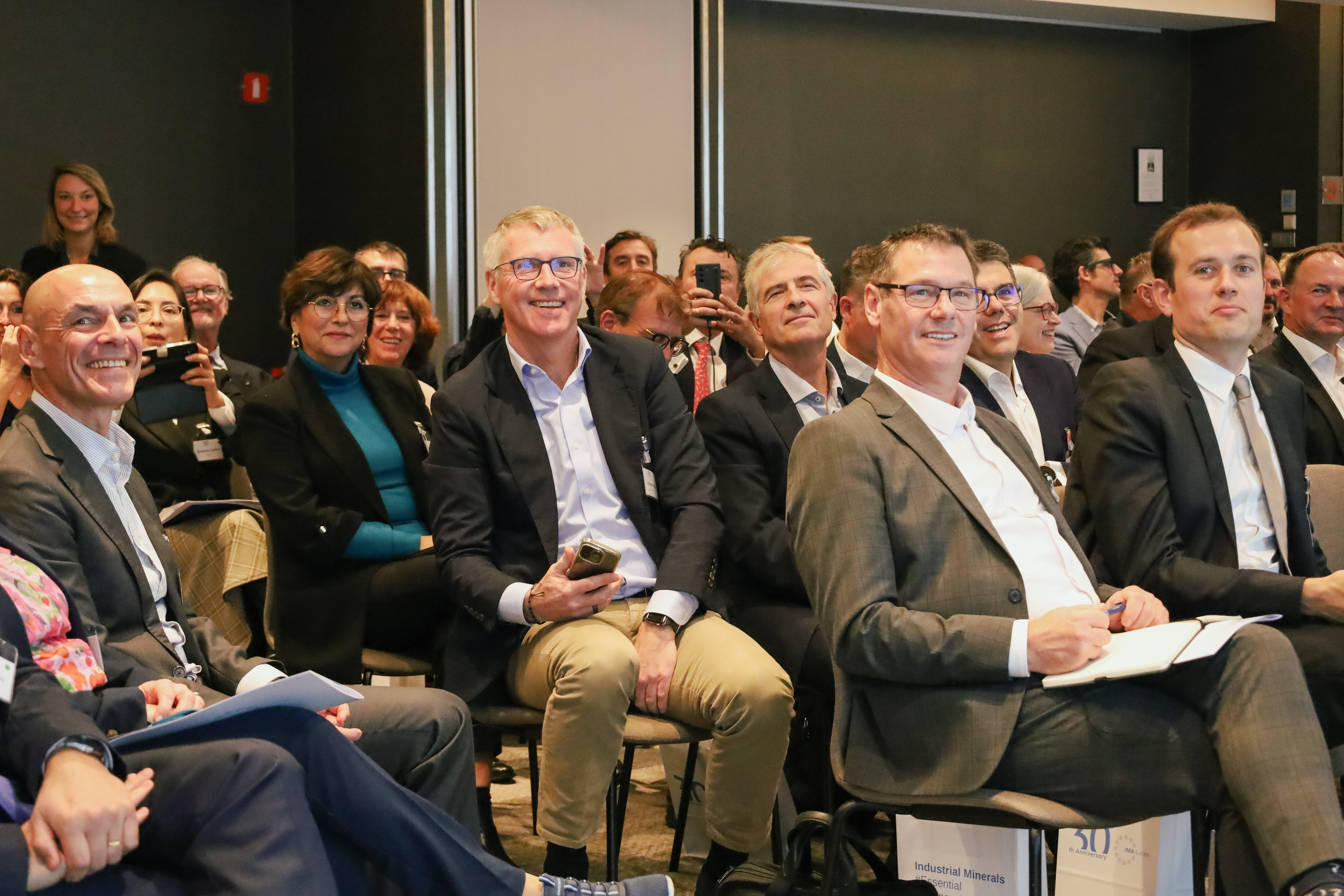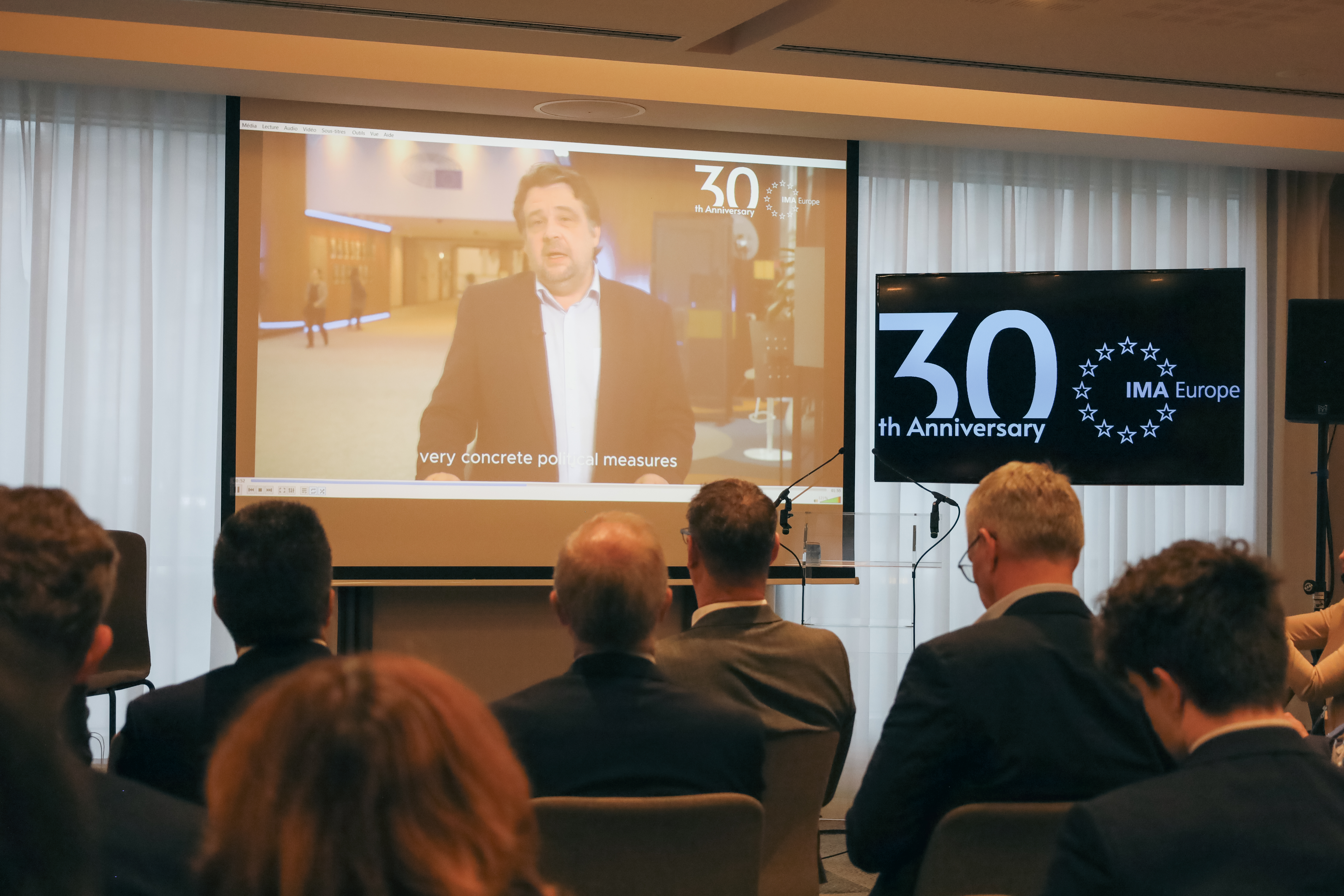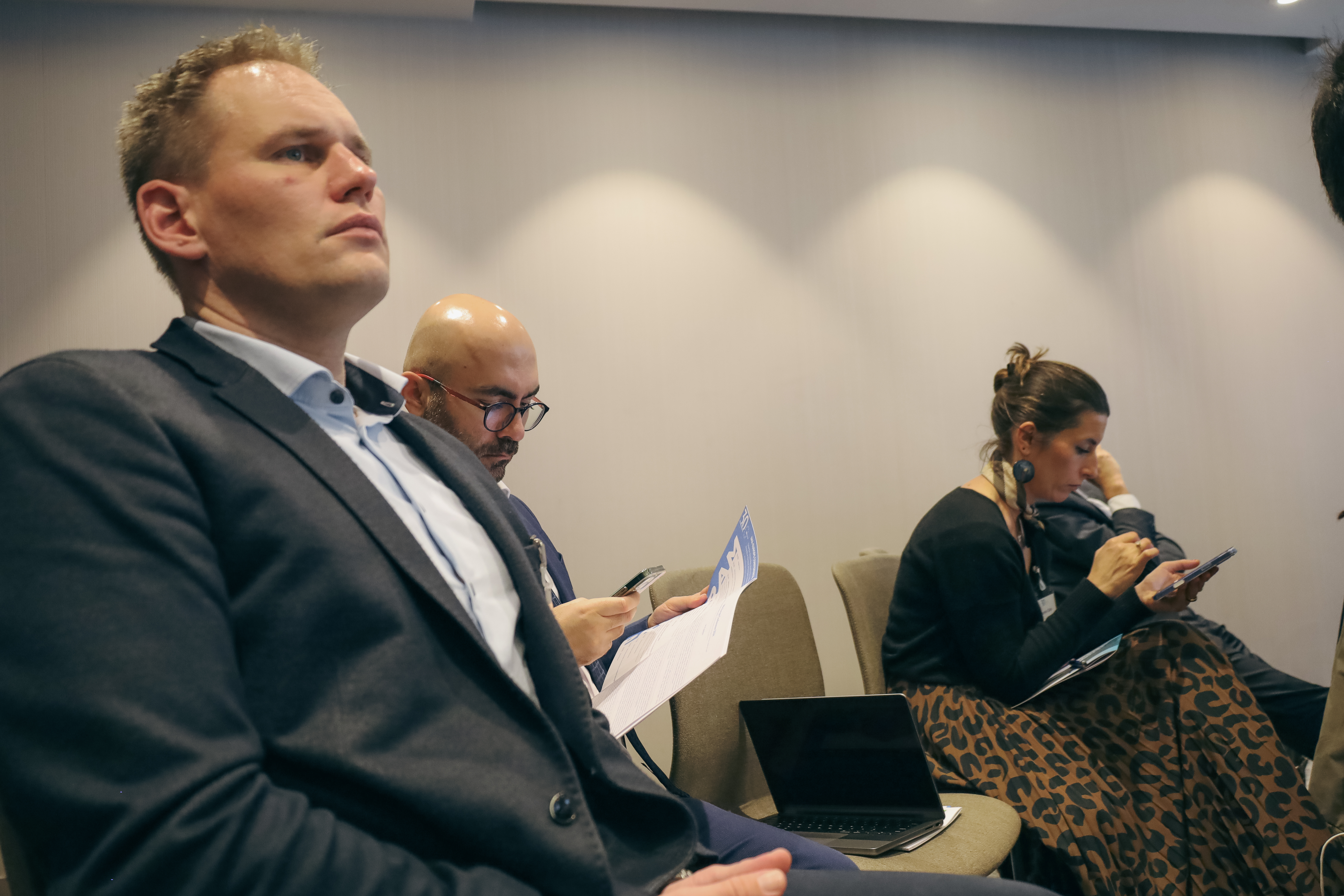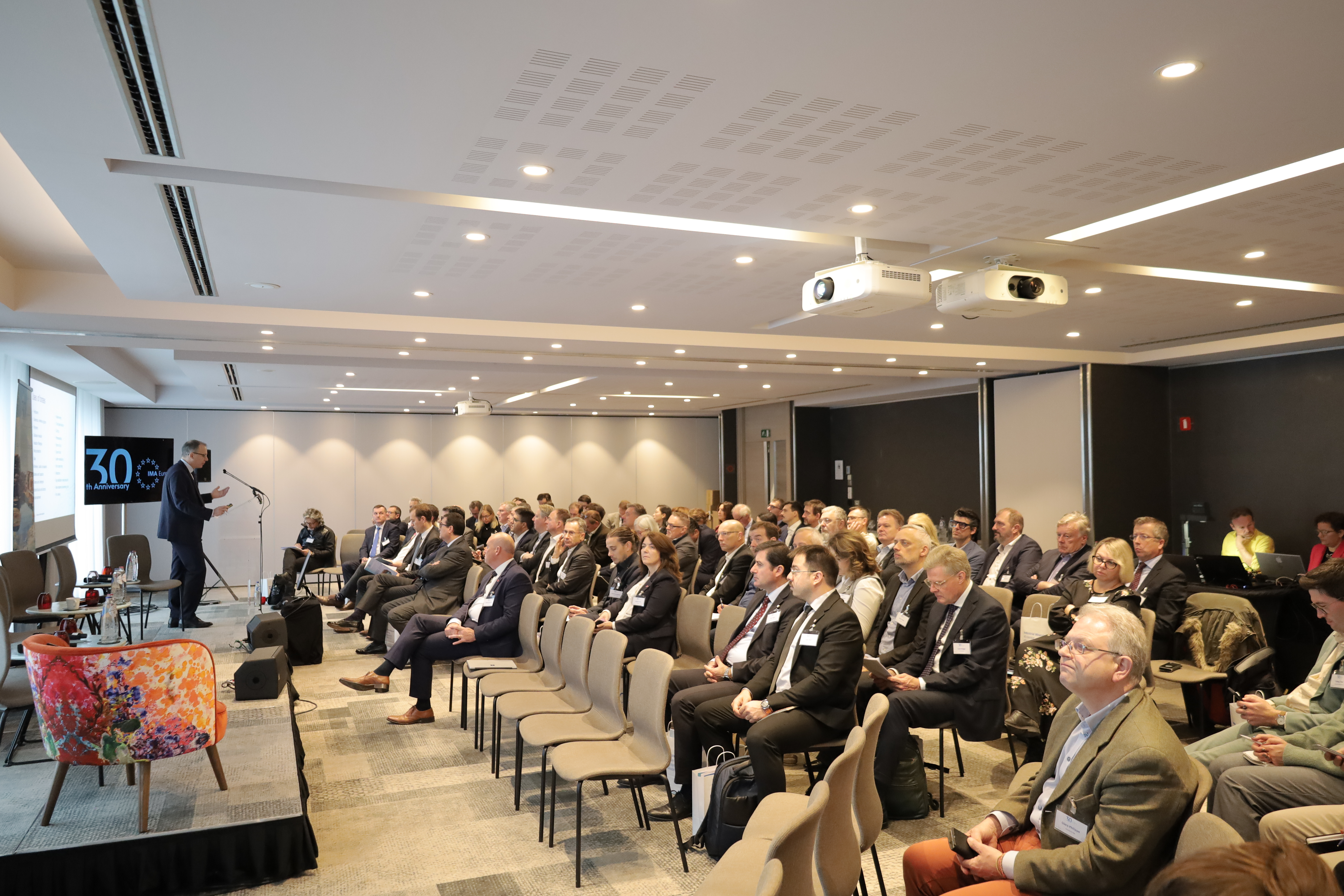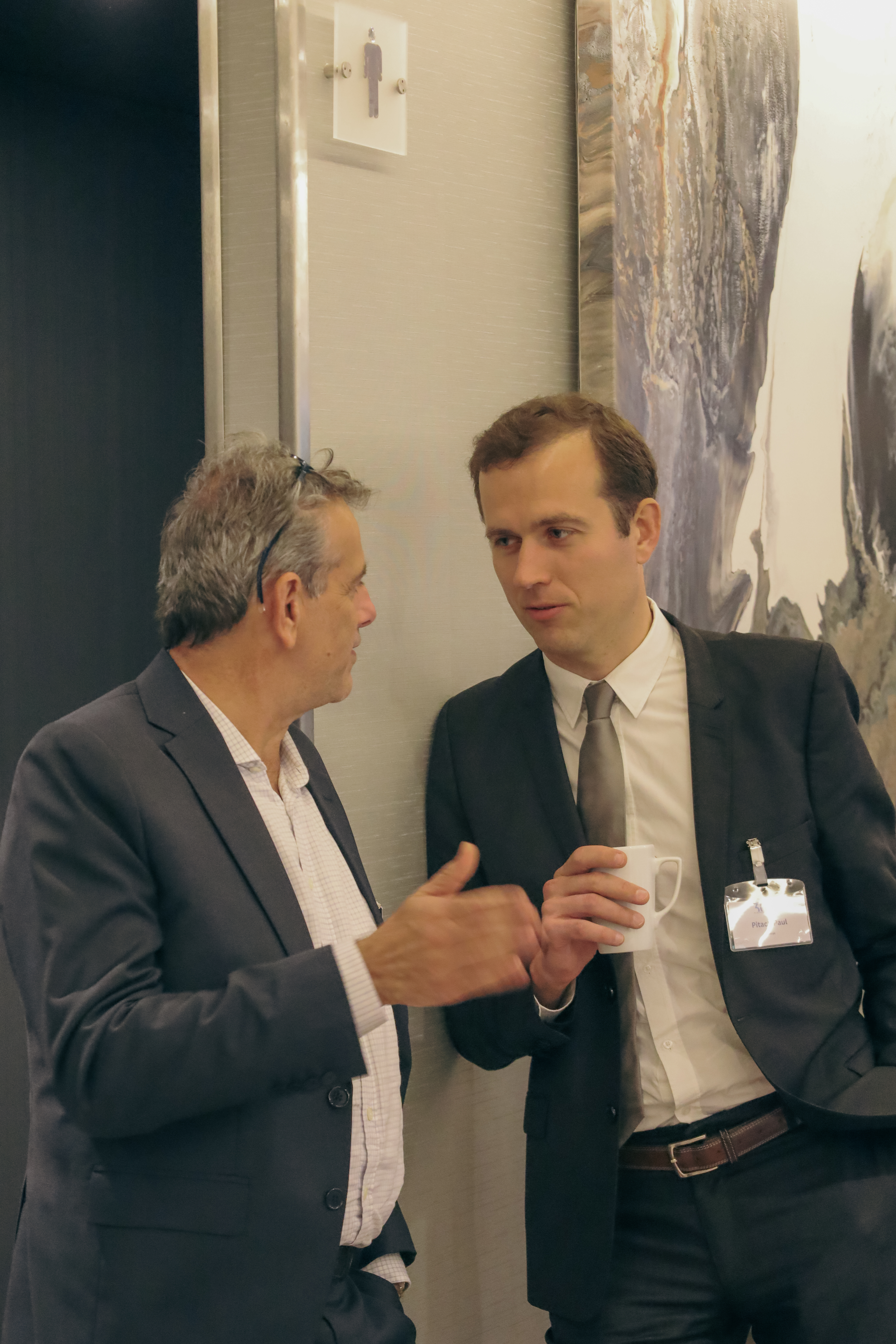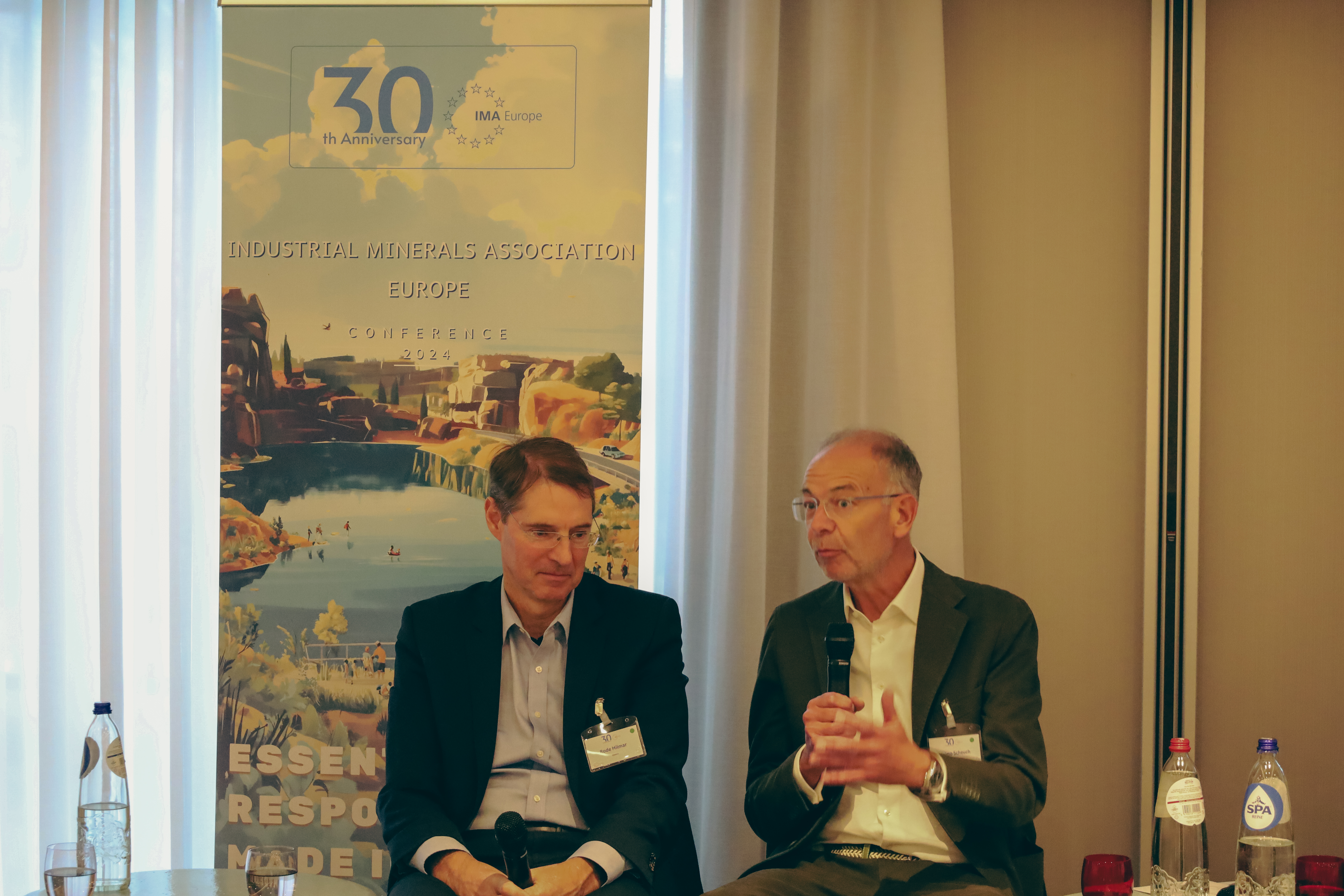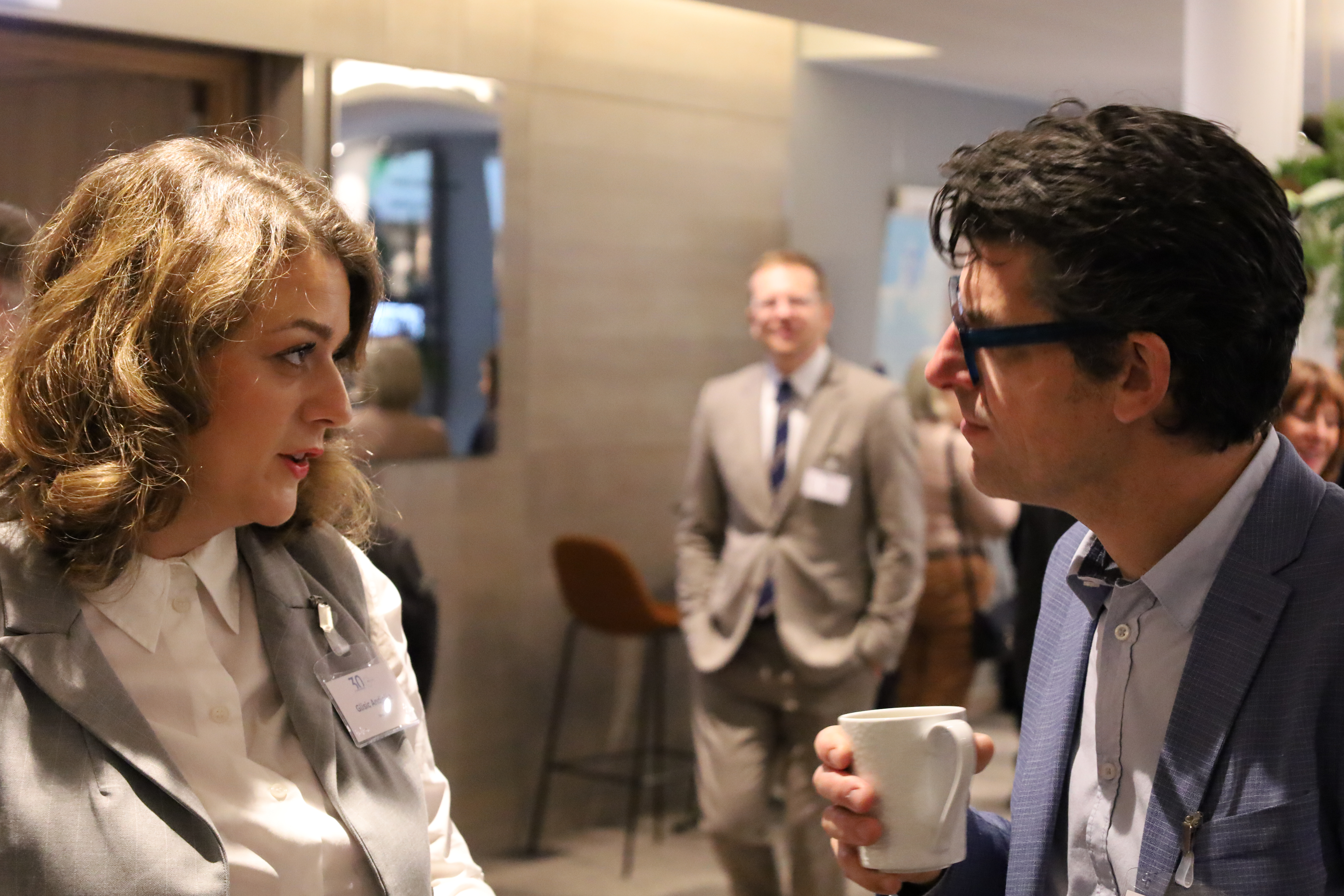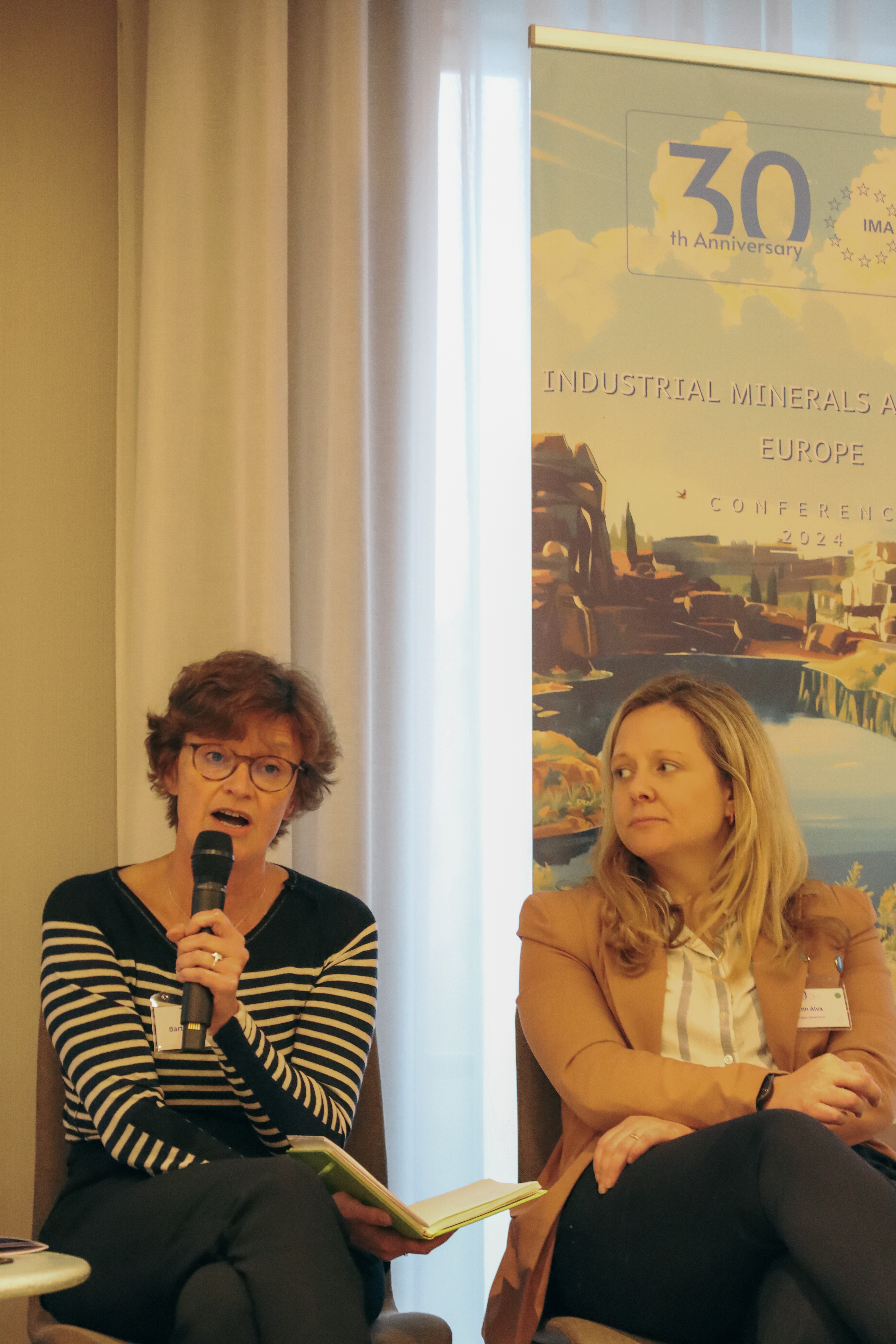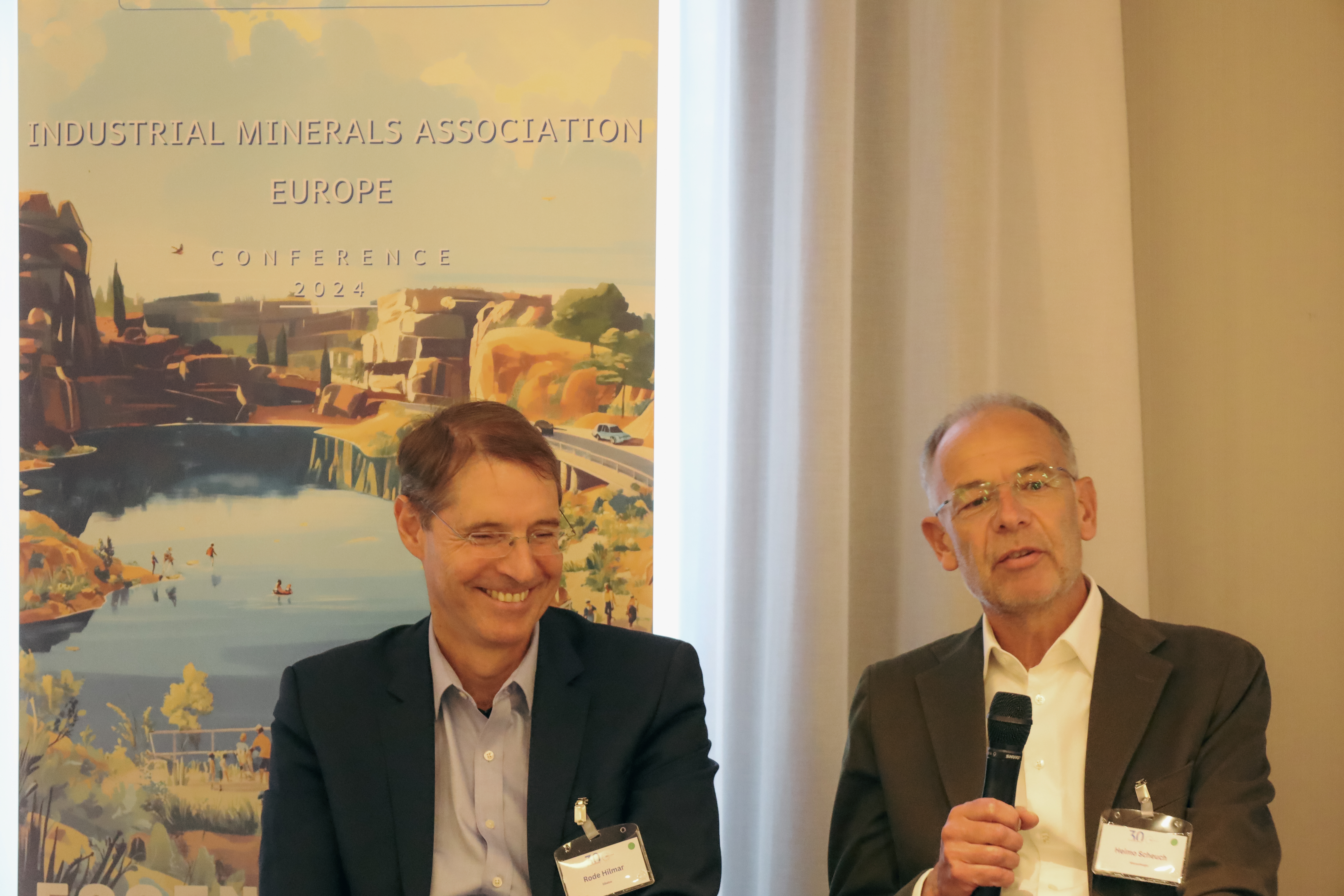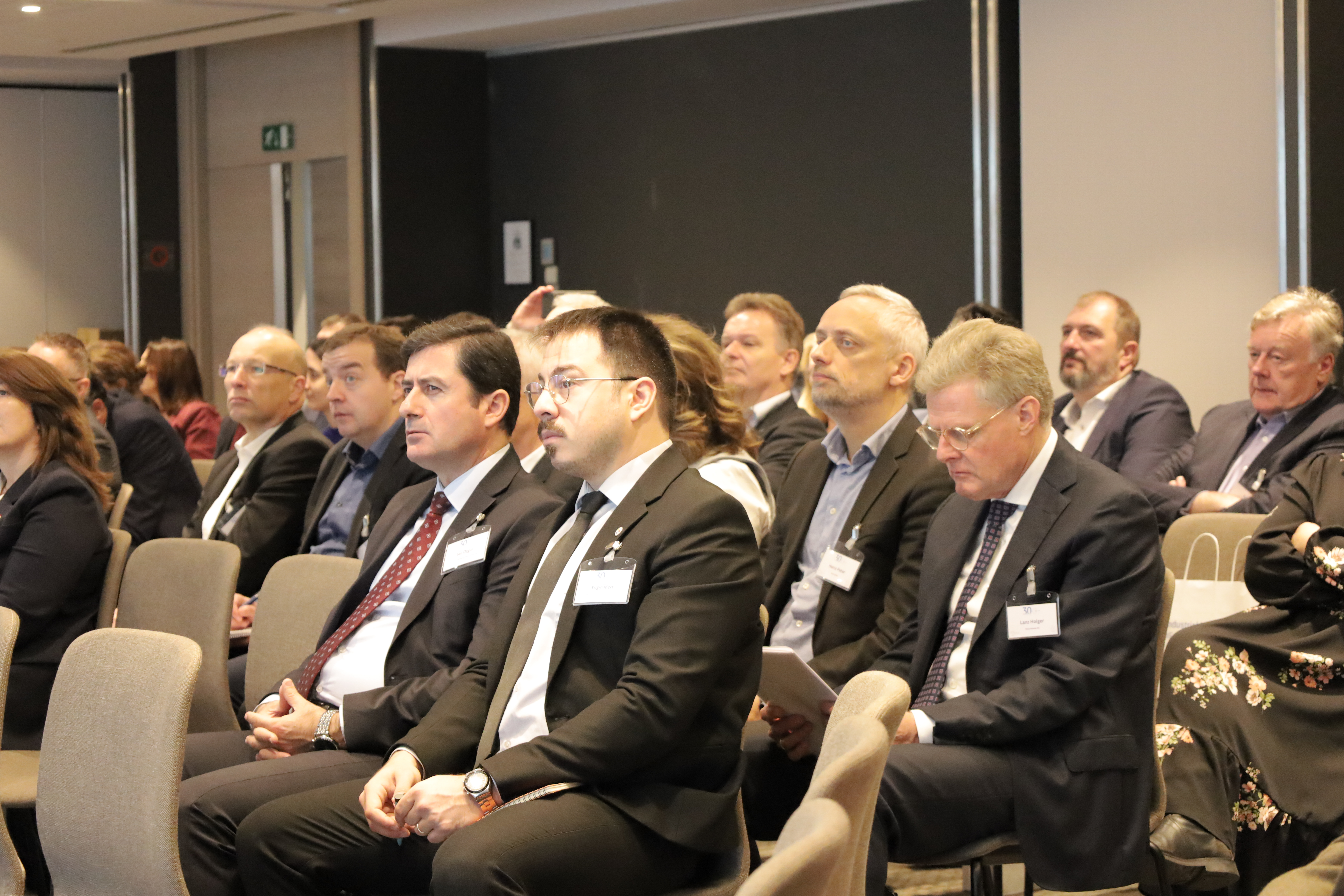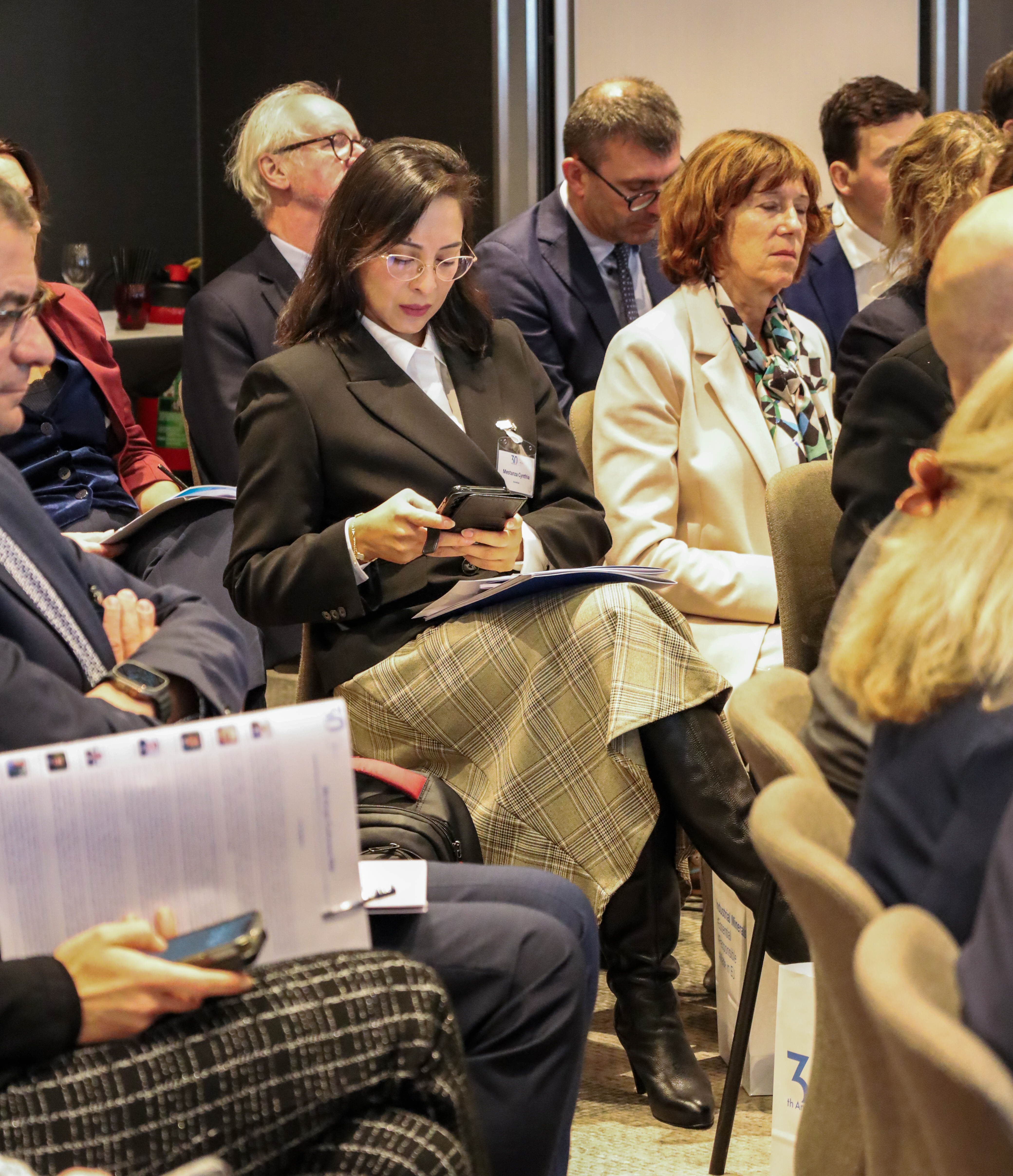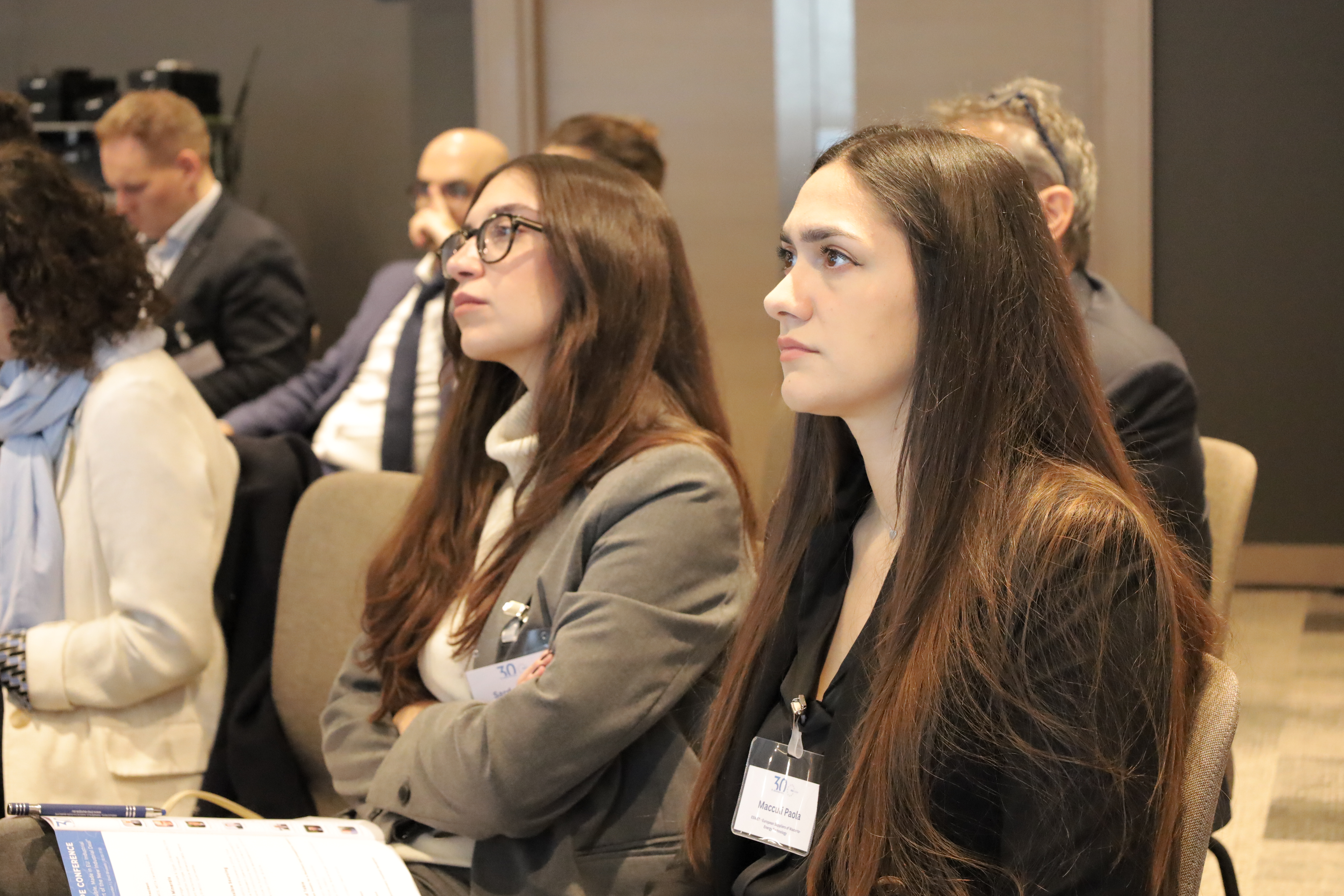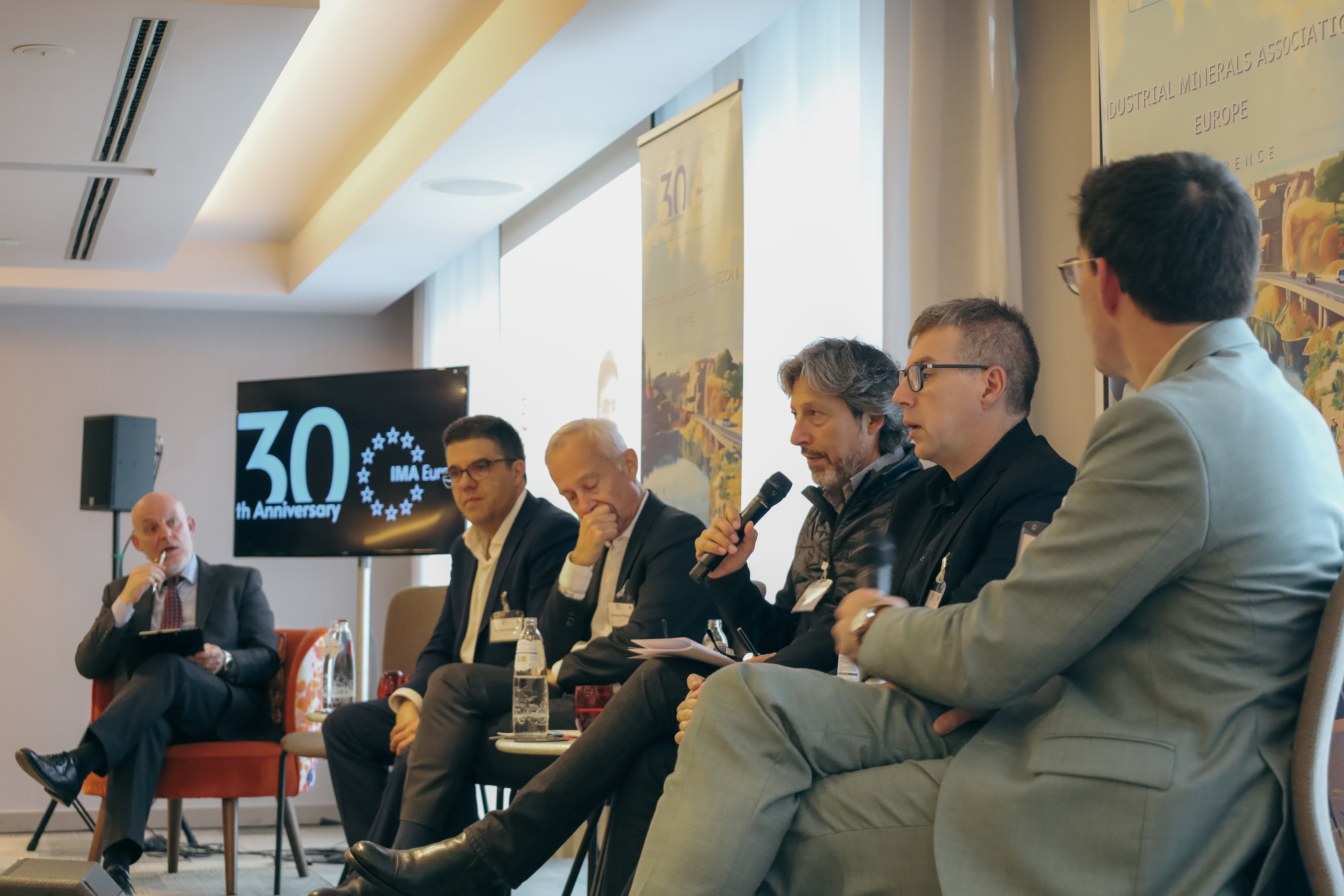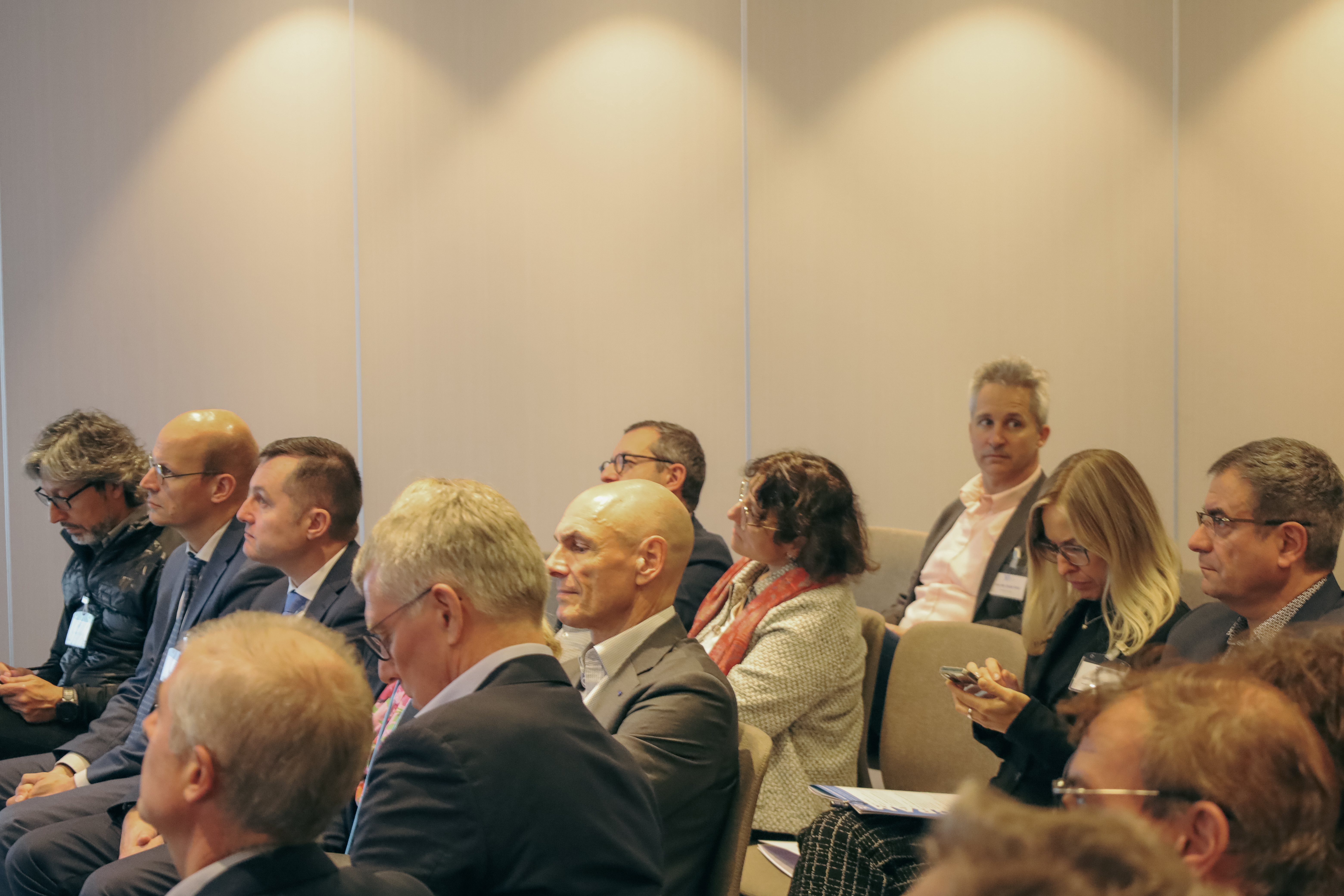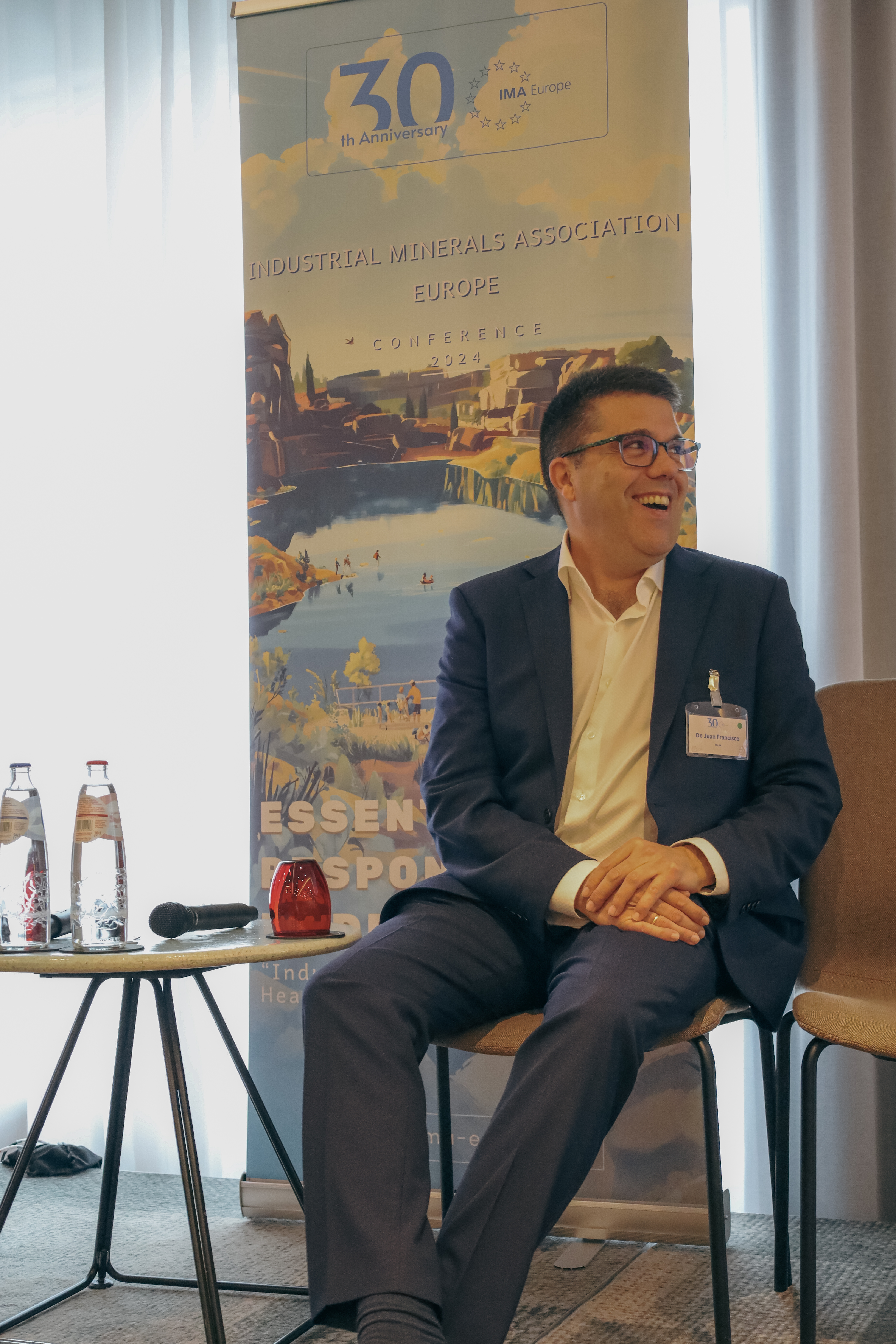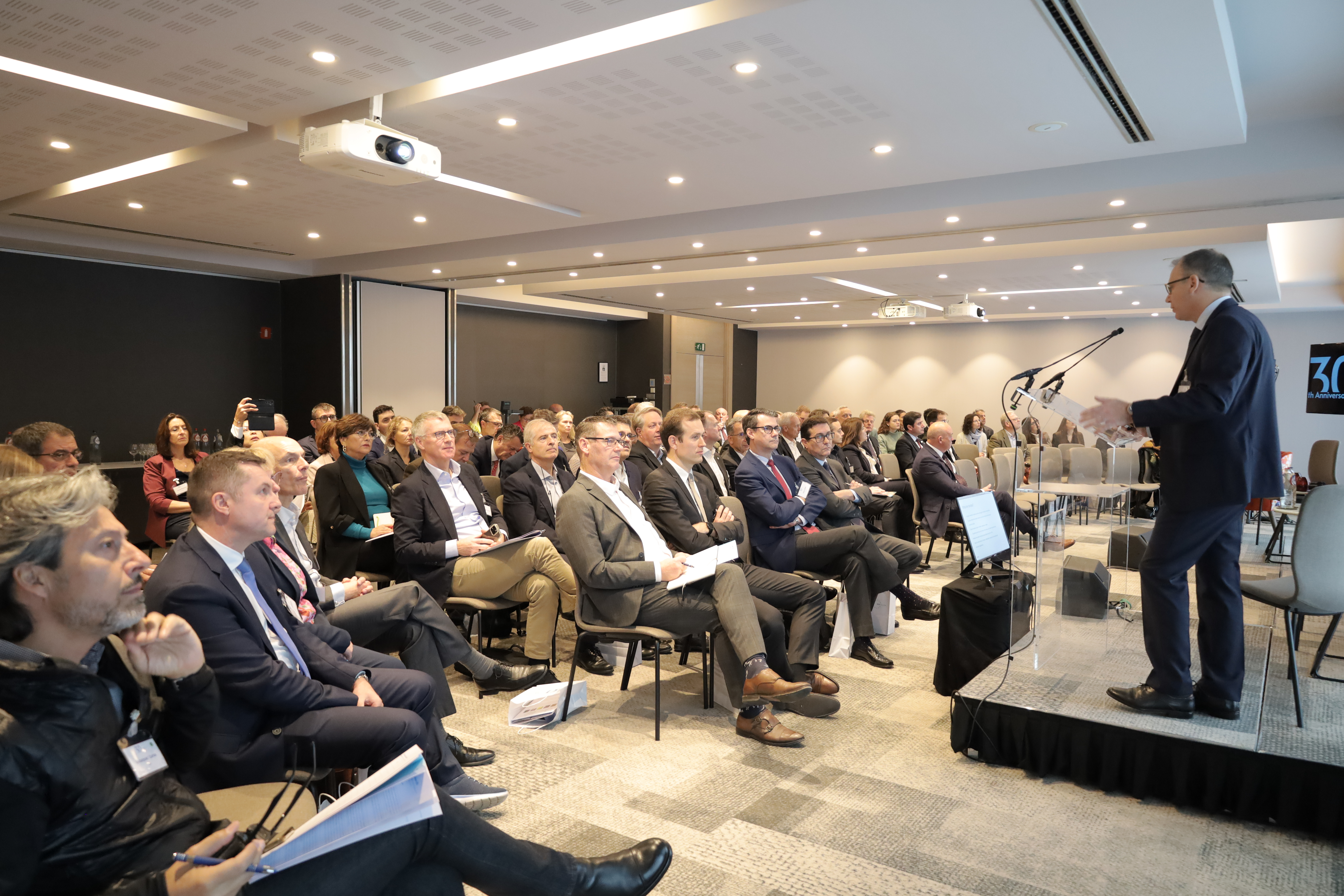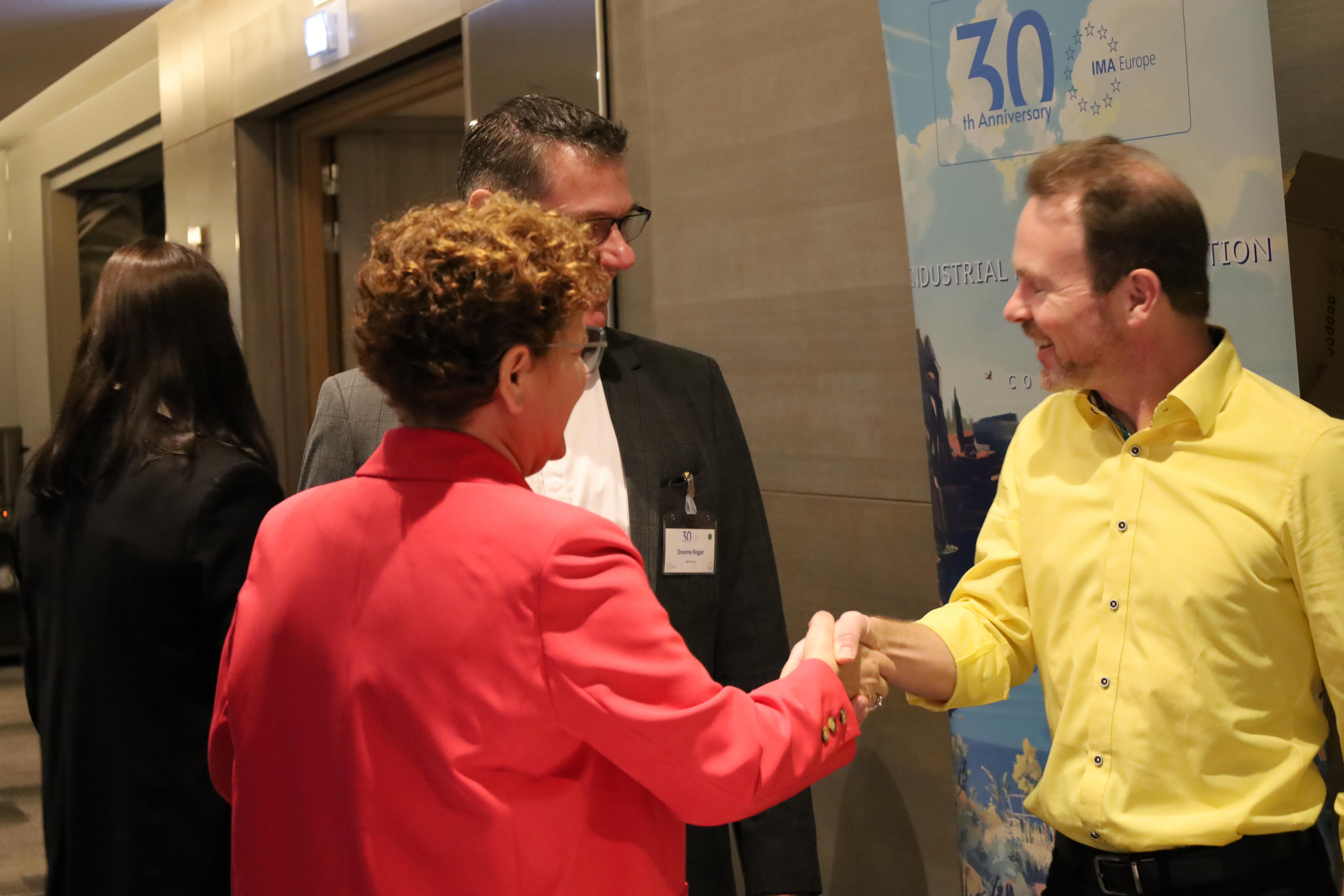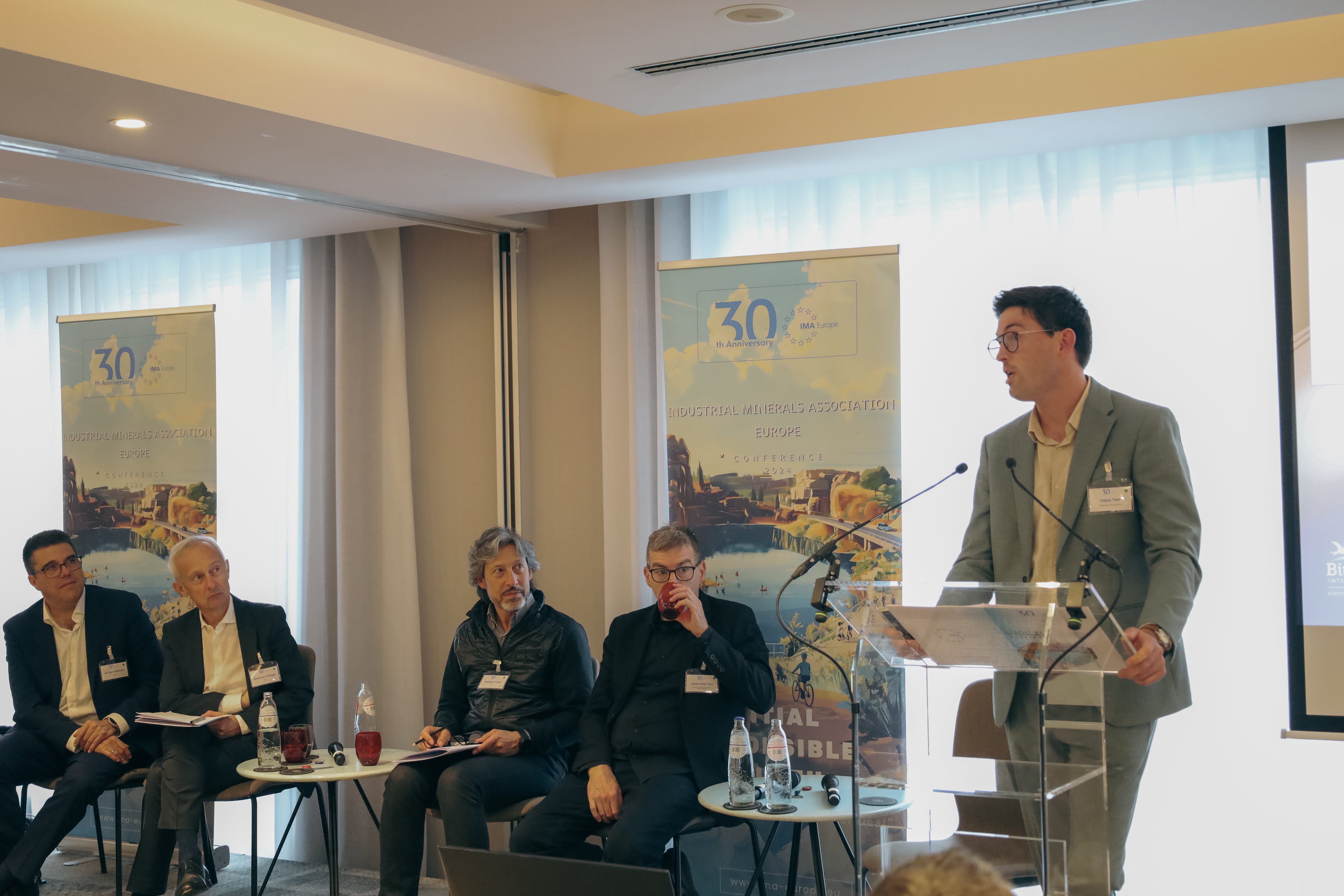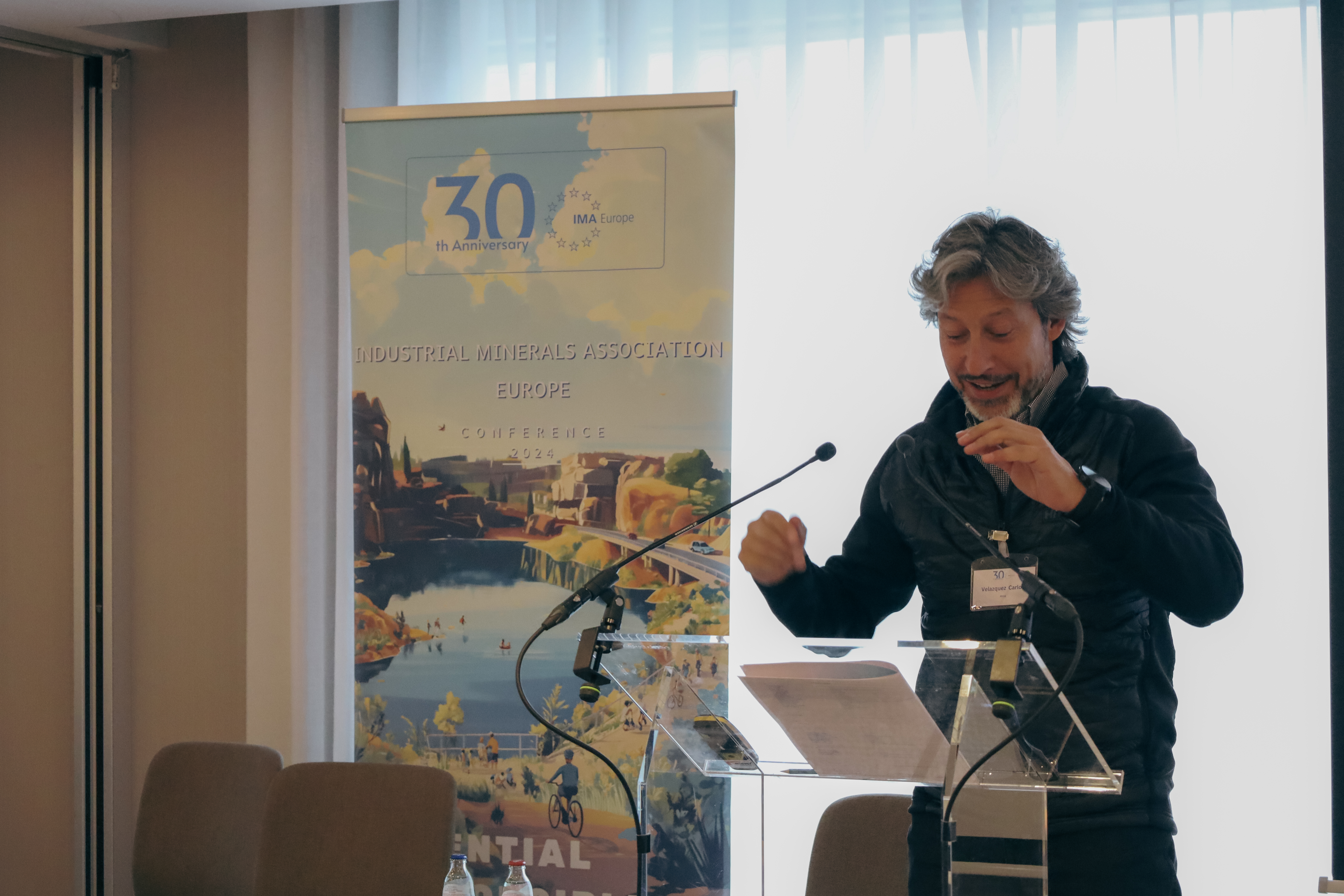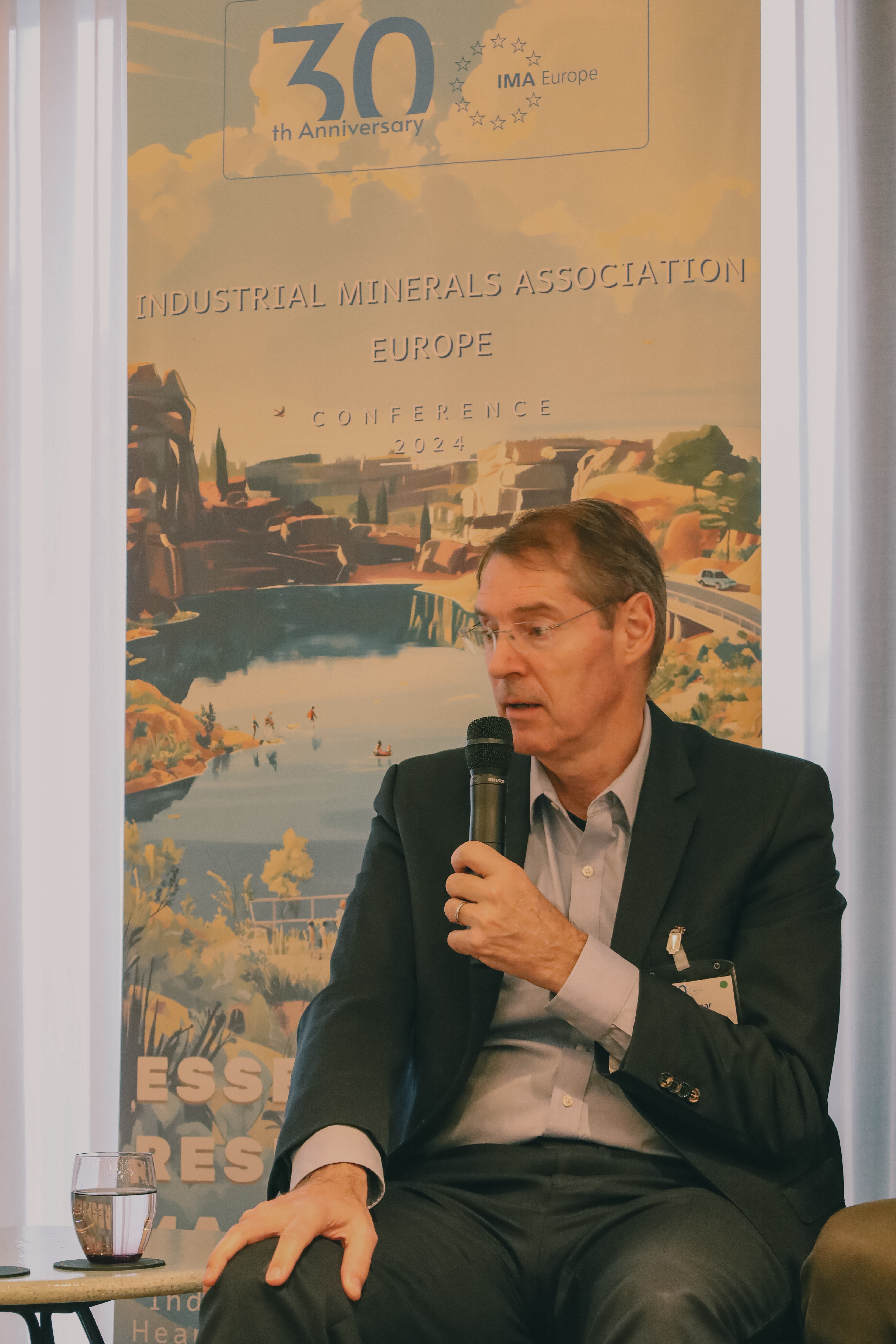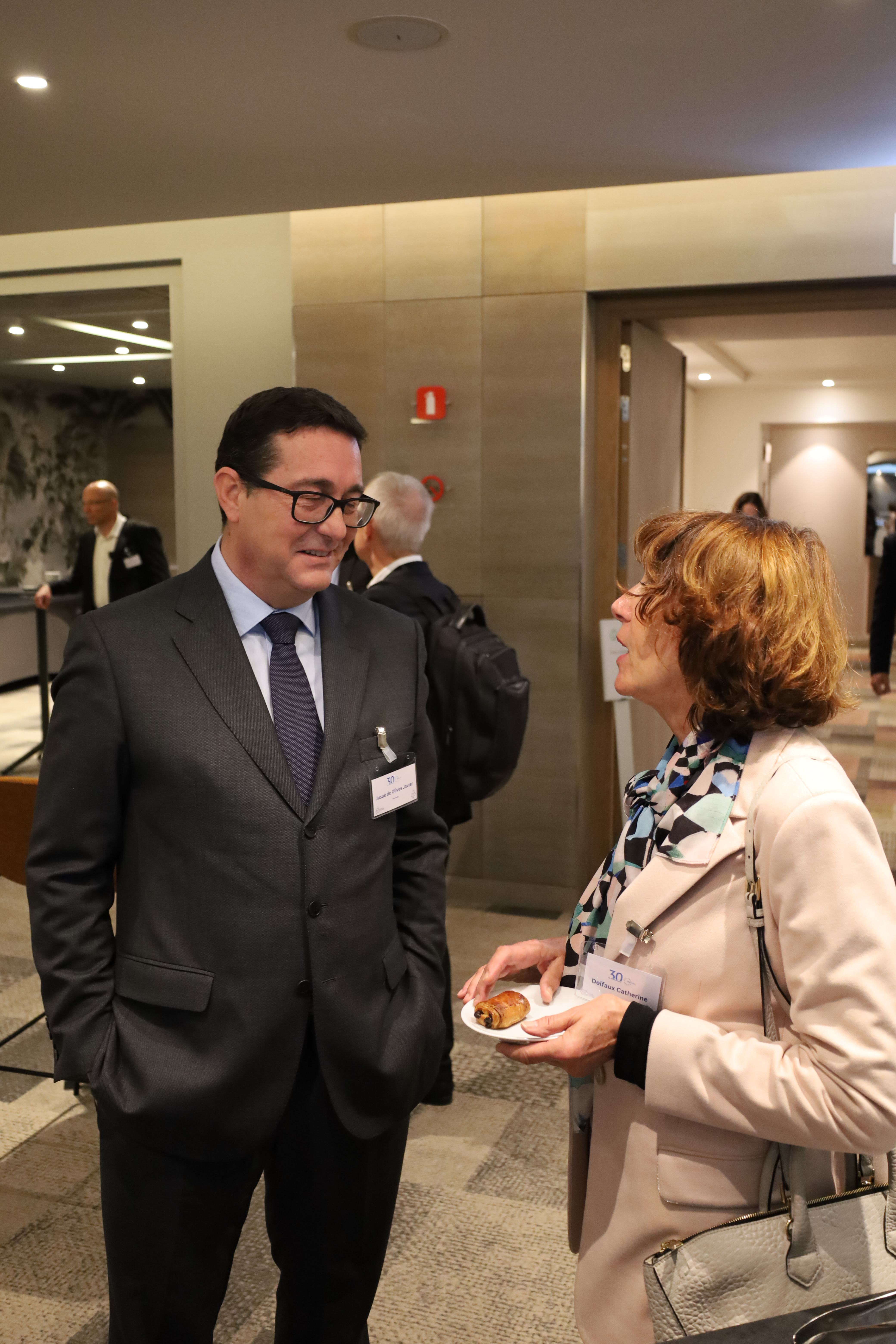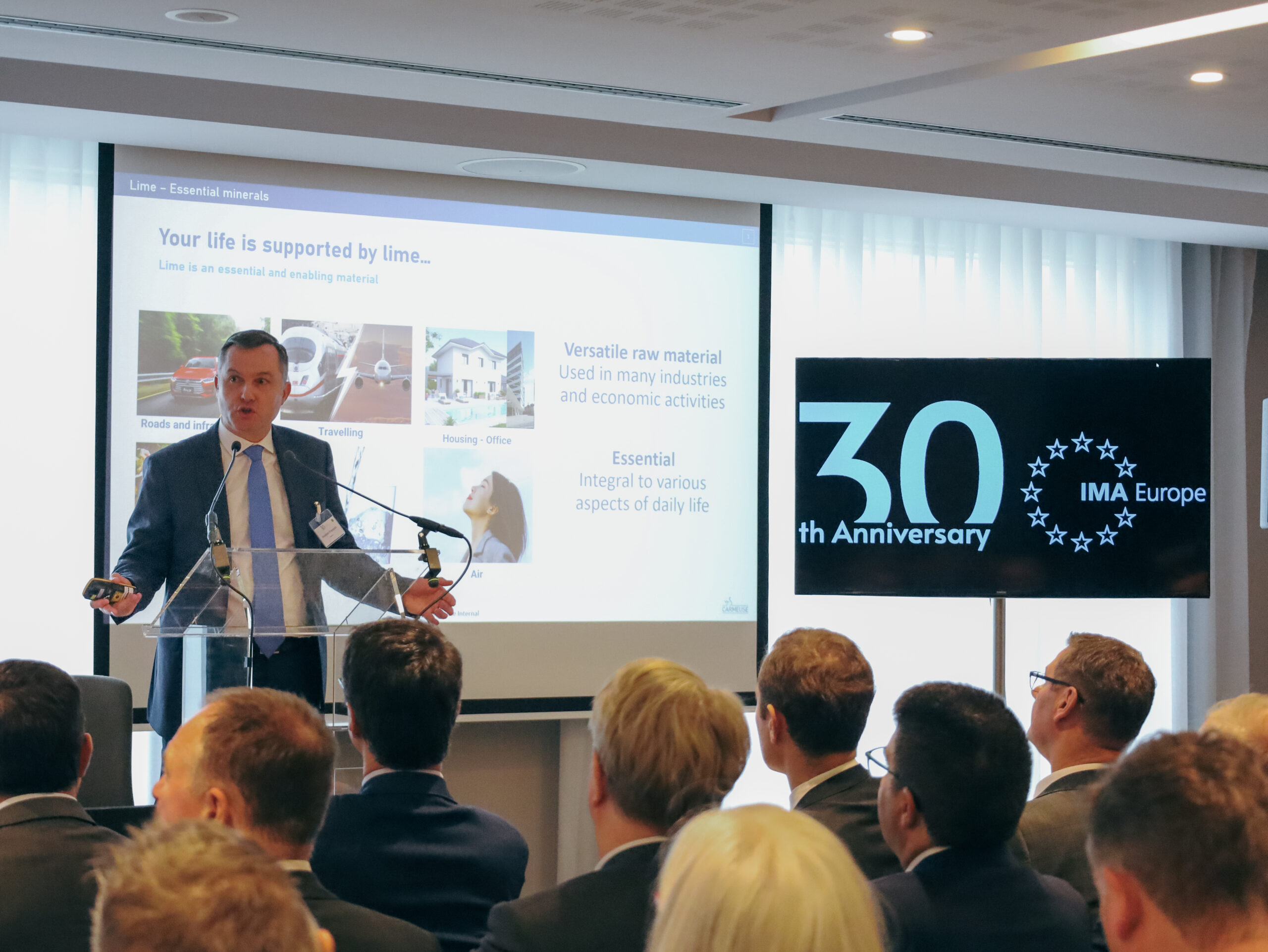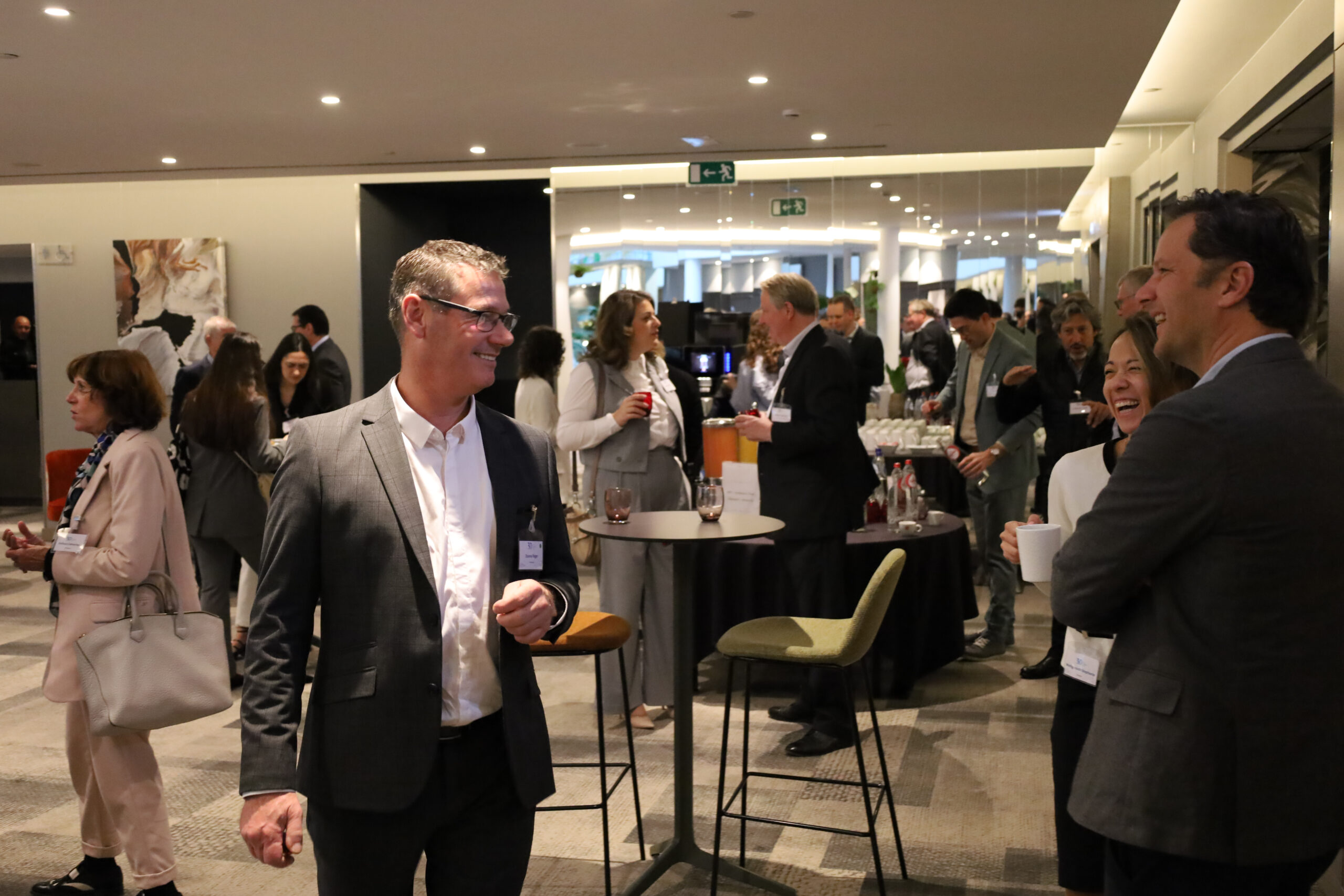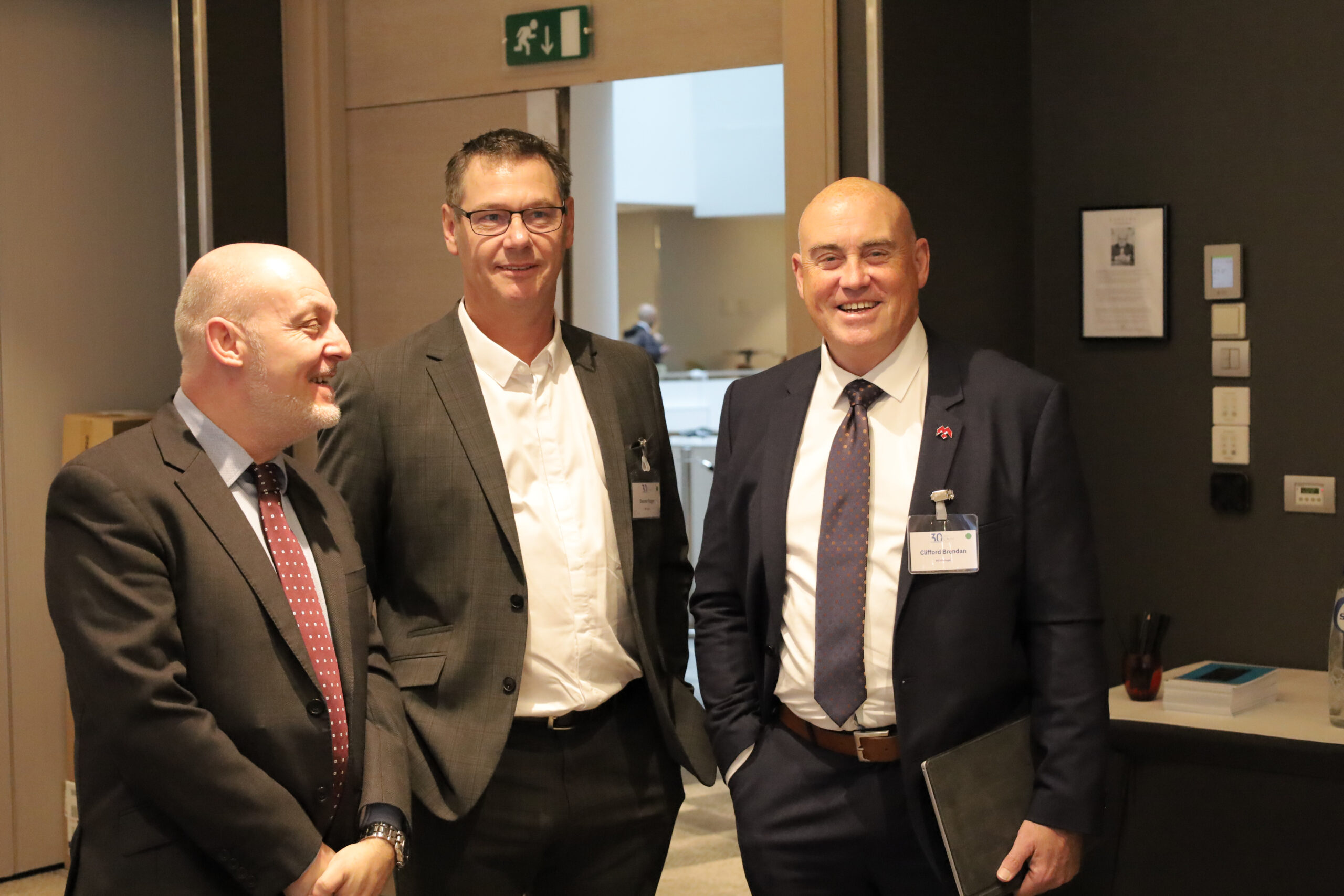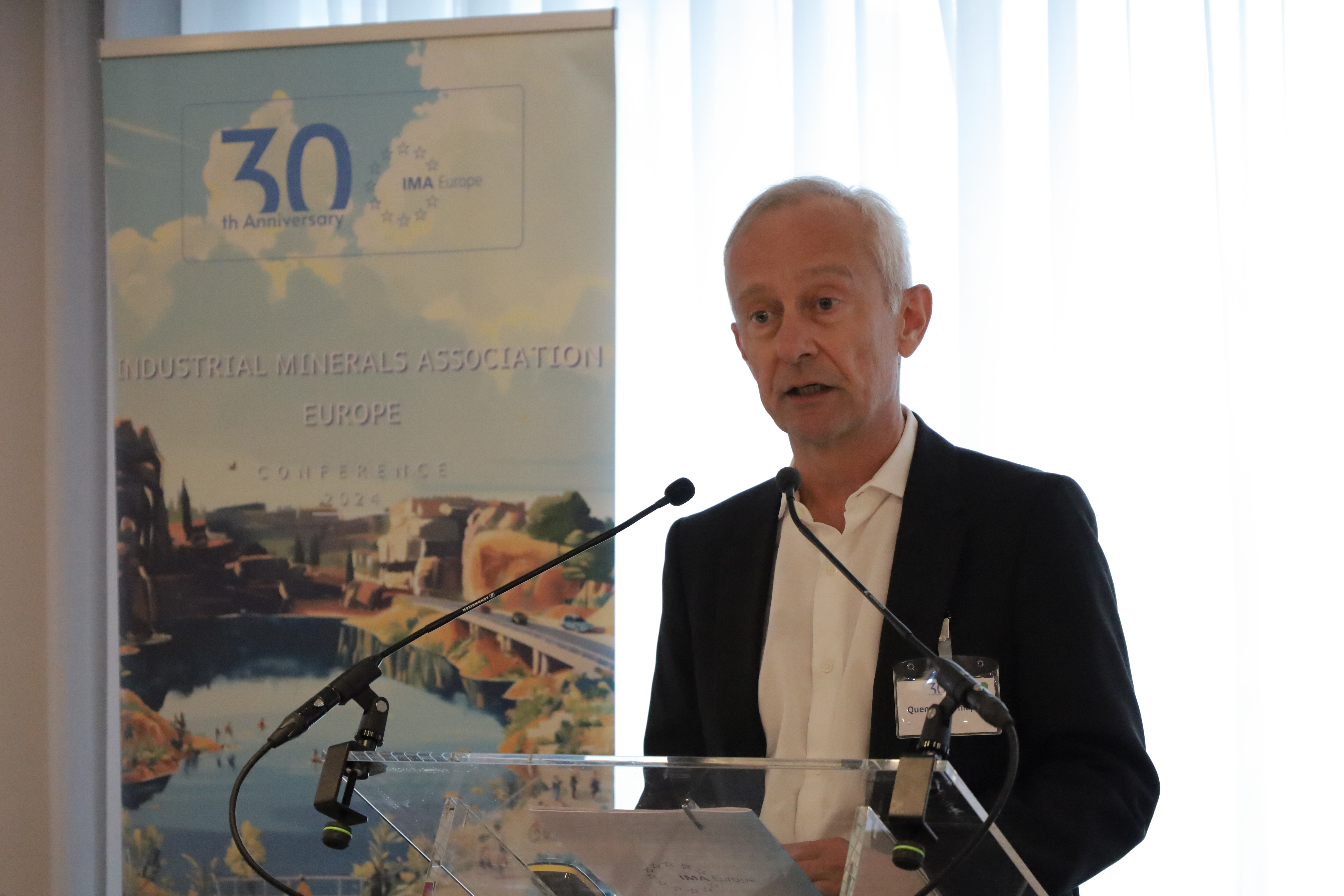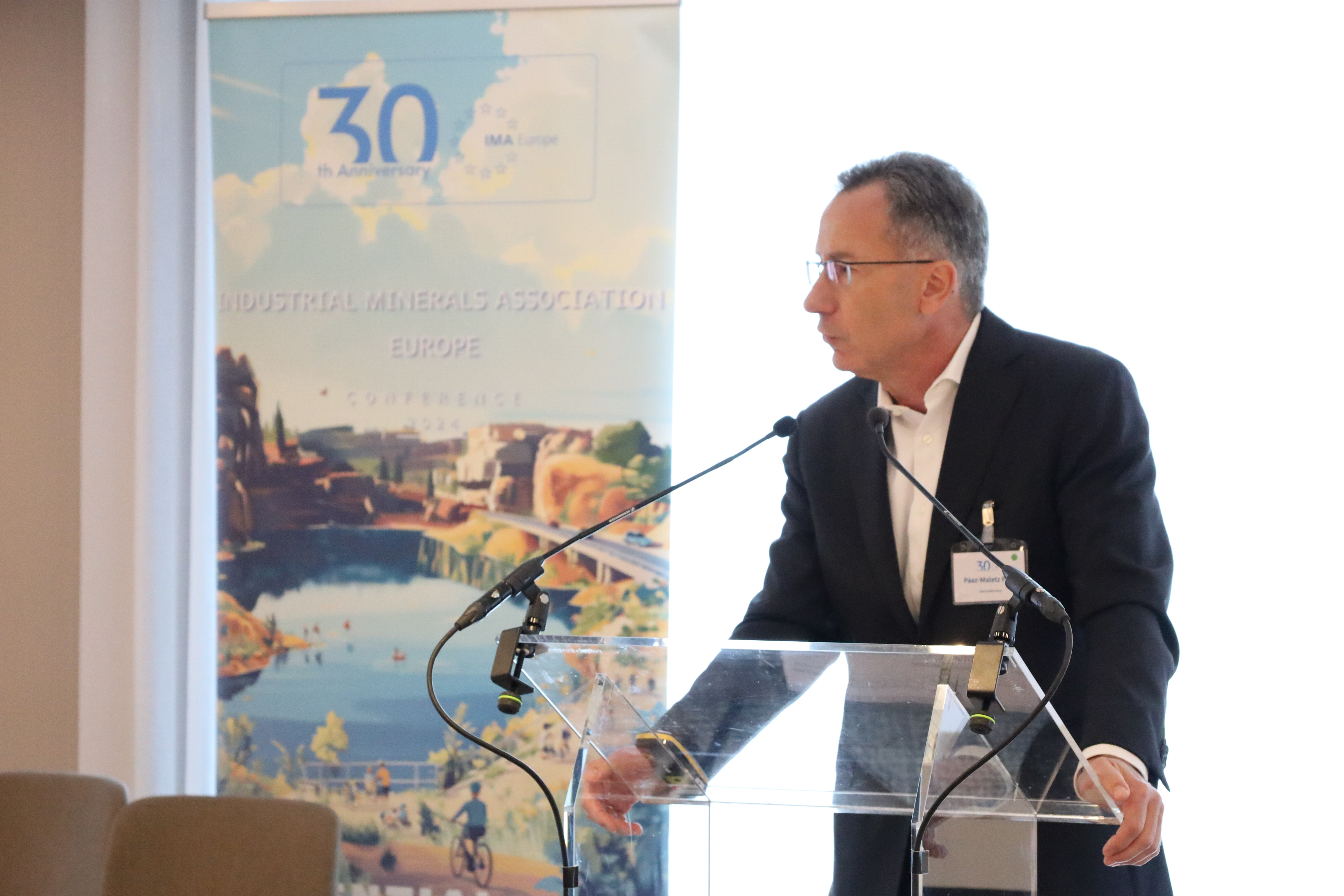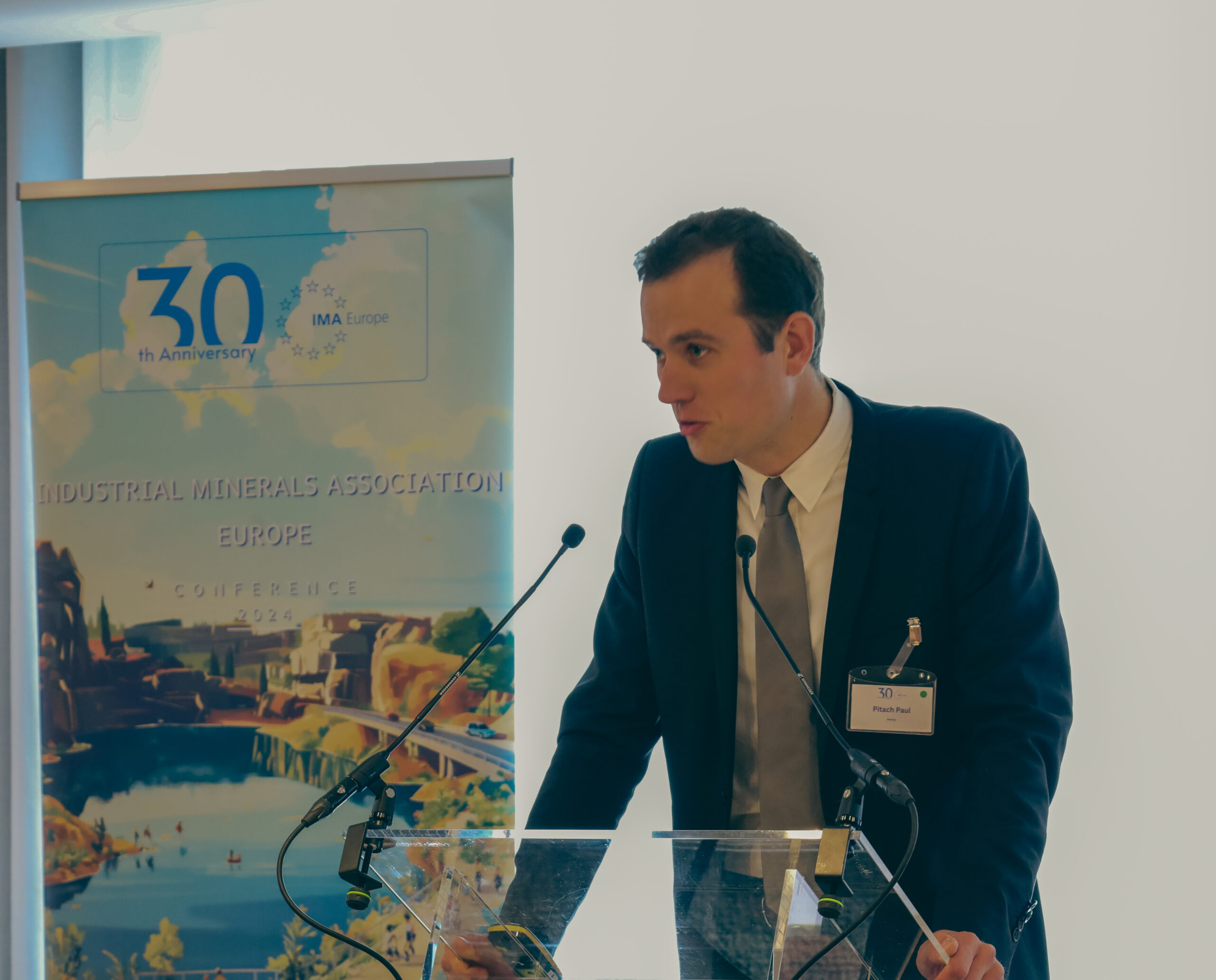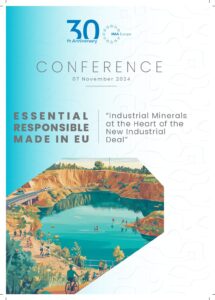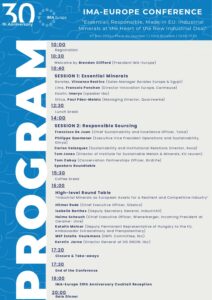IMA-Europe Conference 2024
07 Nov 2024 - 07 Nov 2024
Hotel SOFITEL, Place du Jourdan 1, 1040 Brussels
“Essential, Responsible, Made in Eu: Industrial Minerals at the Heart of the New Industrial Deal“
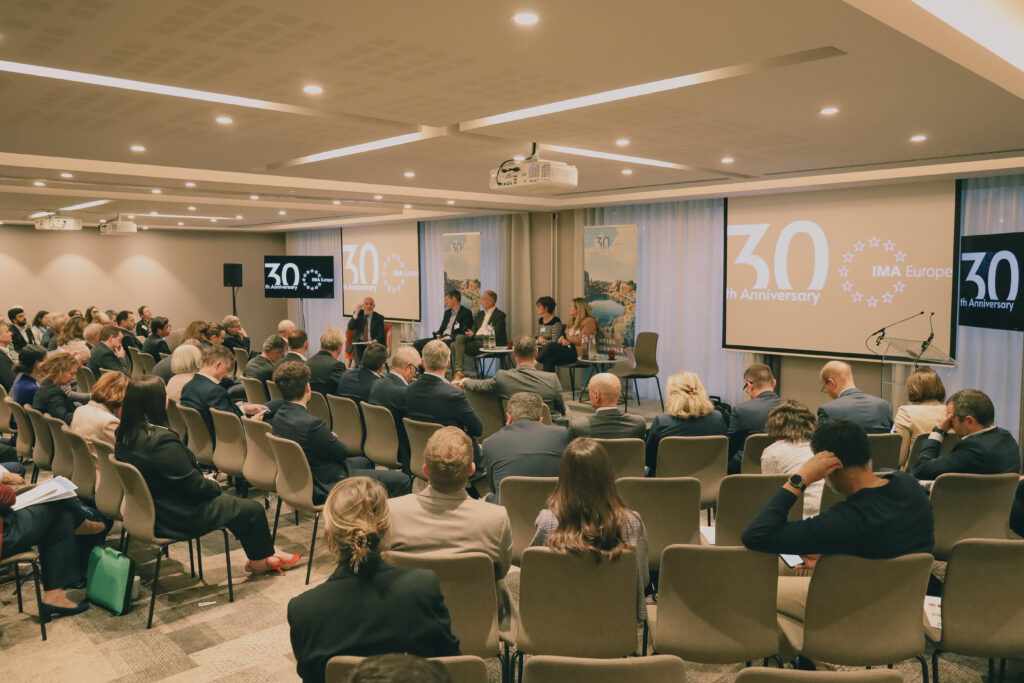
7th November 2024 Brussels
Industrial Minerals Association Europe hosted the Conference: “Essential, Responsible, Made in EU: Industrial Minerals at the Heart of the New Industrial Deal”, where industry leaders, sustainability advocates, and innovation experts gathered to discuss the pivotal role of industrial minerals in building a resilient and sustainable future of Europe.
Mr. Brendan Clifford, President of IMA-Europe greeted participants and launched the event with an opening interview. The Industrial Minerals sector in Europe faces a complex and turbulent economic landscape, shaped by recent global shocks and heightened competition from outside Europe. Industrial minerals, ranging from construction materials to essential elements for electronics and agriculture, power numerous sectors across Europe and beyond. Yet, the impacts of COVID-19, the war in Ukraine, and resulting inflation have created unprecedented economic pressures and disrupted global supply chains.
The COVID-19 pandemic not only impacted lives but also rippled through economies, revealing vulnerabilities in supply chains. With the 2022 energy crisis and inflation resurgence following the Ukraine conflict, Europe has seen a drop in consumer demand and a pivot in consumer spending habits, causing industries to shift their procurement strategies. As a result, the traditional focus on cost-efficiency has evolved into a more diversified and locally-focused approach to sourcing, aiming to mitigate geopolitical risks and secure supply chain resilience.
Today, the sector continues to navigate a challenging environment, with projections for 2024 remaining “cloudy with rain.” Despite the headwinds, the industry’s essential role in Europe’s economy and its alignment with the EU’s Green and Digital transitions underscore its resilience. For industrial minerals to thrive in this context, supportive regulatory policies, robust investments, and innovation-driven partnerships are essential. A collaborative focus on local sourcing could bolster economic stability and enhance Europe’s mineral security, but realizing this vision will demand accelerated investment and sustained community engagement.
By addressing misconceptions and highlighting the benefits of responsible mining, the industry can foster greater public understanding and support. Clear regulatory frameworks, aligned European policies, and a commitment to education and upskilling will be crucial to enabling a thriving industrial minerals sector.
For Europe’s industrial minerals to continue supporting vital sectors and green goals, the focus must remain on fostering innovation, strengthening local supply chains, and prioritizing responsible resource use. The conference concluded with a reminder: “If you can’t grow it, you have to mine it.” Industrial minerals are foundational to our quality of life and Europe’s economic resilience. Ensuring they remain “Essential, Responsible, Made in EU” is a collective responsibility we cannot overlook, said Mr. Clifford.
The conference featured two insightful sessions: Essential Minerals and Responsible Sourcing, both of which underscored the sector’s commitment to advancing Europe’s green and digital transitions, and building a resilient future for EU.
With expert insights and practical case studies, the event highlighted how industrial minerals are indispensable in our daily lives and how responsible sourcing can pave the way for a more sustainable future.
Session 1: Essential Minerals
Industrial minerals, so widely used and often unnoticed, are crucial to a wide range of applications that power industries and support everyday life. The session on Essential Minerals featured speakers from leading mineral IMA member companies, each of whom illustrated the vital roles these minerals play in supporting industries across Europe:
- Vincenzo Restivo, Sales Manager at US BORAX Rio Tinto, explained how borates are central to sectors such as agriculture, glass, batteries, pharmaceuticals, and electronics. By enhancing crop yields and improving product durability, borates contribute significantly to economic and environmental sustainability for more than 100 years.
- Francois Ponchon, Director of Innovation Europe at Carmeuse, highlighted lime’s versatile role in steel making, environmental protection and energy efficiency, from water purification to air emissions control, supporting Europe’s green transition, and also how lime applications naturally absorb up to 33% of the process CO2 emissions via the recarbonation process.
- Paul Pitach, Vice President of Performance Minerals at Imerys, discussed the unique properties of bentonite minerals in producing high-performance materials essential for industries ranging from automotive to construction but also in filtration of wine and editable oils and pulp & paper making.
- Paul Paez Maletz, Managing Director at Quarzwerke Group, showcased how quartz and silica-based materials are integral to advanced manufacturing processes, including semiconductors and photovoltaic cells.

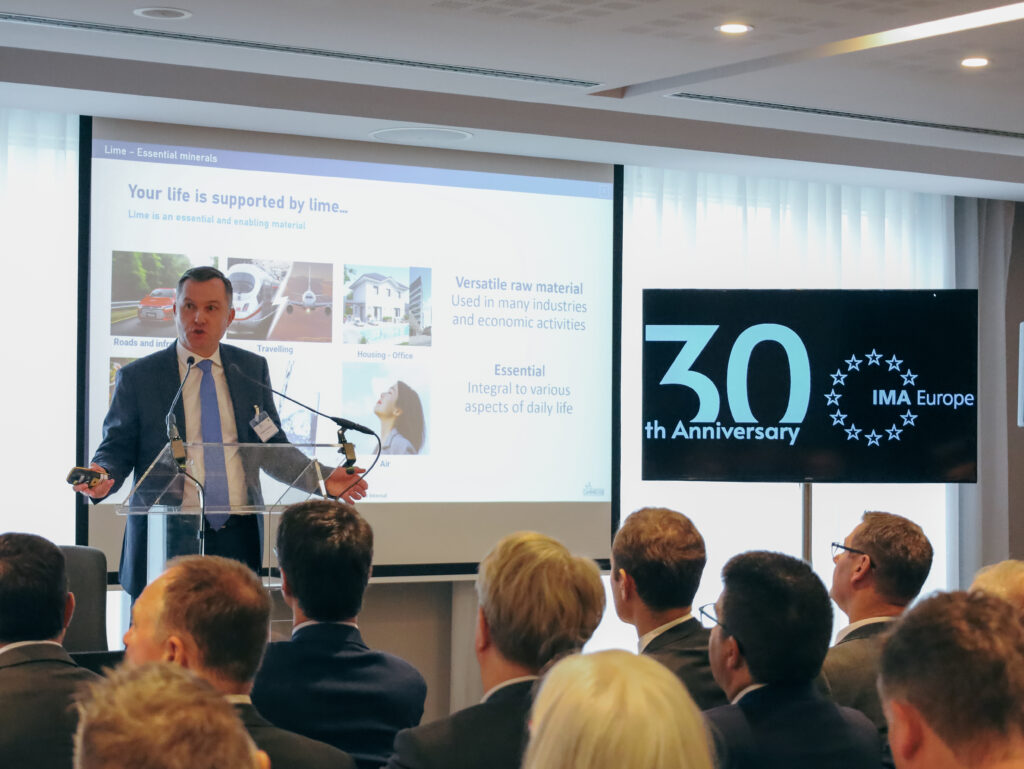
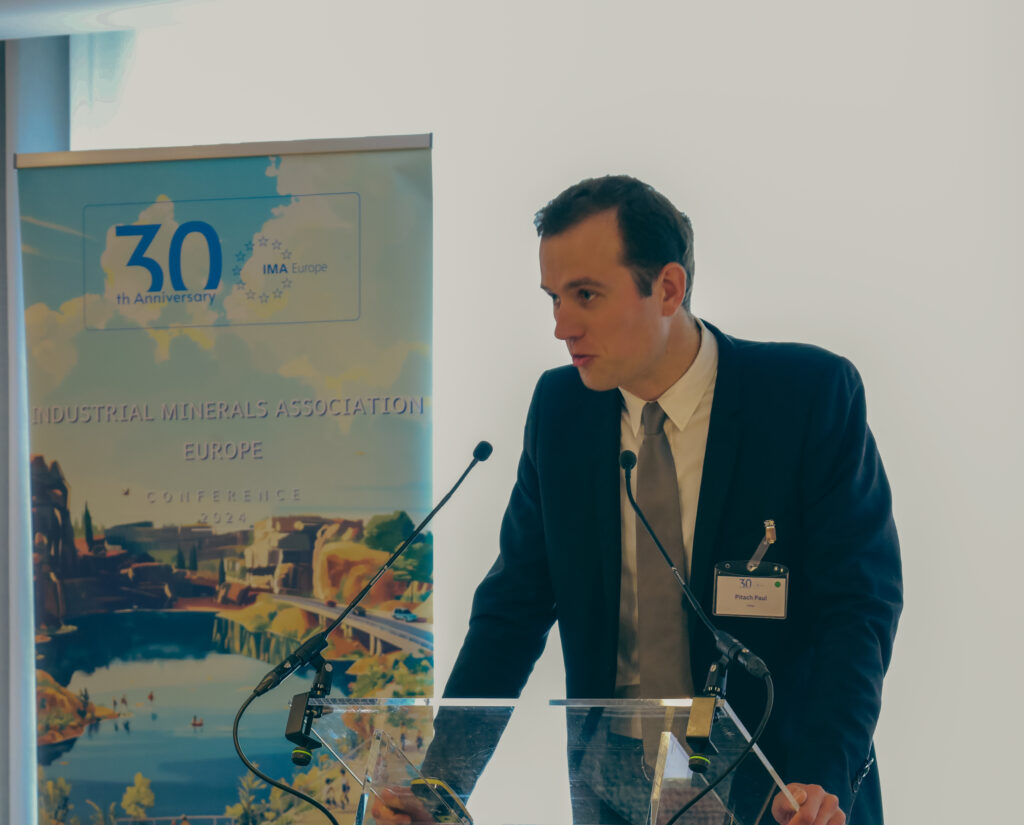

Through these presentations, it became clear that essential minerals are at the heart of Europe’s industrial backbone, enabling growth while meeting high environmental standards. With these minerals, Europe is better equipped to meet the growing demand for sustainable products and materials.
Session 2: Responsible Sourcing
As the industry advances, there is an increasing focus on responsible sourcing to ensure environmental integrity, ethical practices, and resilience throughout the supply chain. The Responsible Sourcing session brought together experts who shared strategies and best practices for achieving sustainability across all stages of mineral sourcing and production.
- Francisco De Juan, Chief Sustainability and Excellence Officer at Tolsa, emphasized the need for transparent and sustainable mining practices. Tolsa’s initiatives prioritize minimal environmental impact, community engagement, and efficient resource utilization in their operations across multiple geographical operations in EU, America’s and Africa.
- Philippe Quemener, Executive Vice President of Operations and Sustainability at Omya, discussed Omya’s commitment to reducing its carbon footprint and implementing sustainable production practices in the quarry (extraction & restoration), in processing stages, green energy generation & purchasing as well as with sustainable transportation vessels in their operations around the world.
- Carlos Velazquez, Sustainability and Institutional Relations Director at Roca Group, highlighted Roca’s approach to integrating sustainability in its supply chain cooperation initiatives. Roca strategy is underpinned by 6 pillars: growth, sustainability, people, operational excellence, innovation and digital transformation.
- Peter Tom Jones, Director of the Institute for Sustainable Metals & Minerals at KU Leuven, presented on the imdilema of Europe whether to mine or not in EU? He shared his experiences with the developments of Lithoum projects in EU. He illustrated the role of communities to be involved as early as possible in the development stages of EU projects
- Tom Cabuy, Conservation Partnerships Officer at Birdlife, offered insights into biodiversity preservation efforts linked to mining activities, underscoring the importance of protecting ecosystems in and around mining sites and the importance of partnerships to manage biodiversity accordingly.
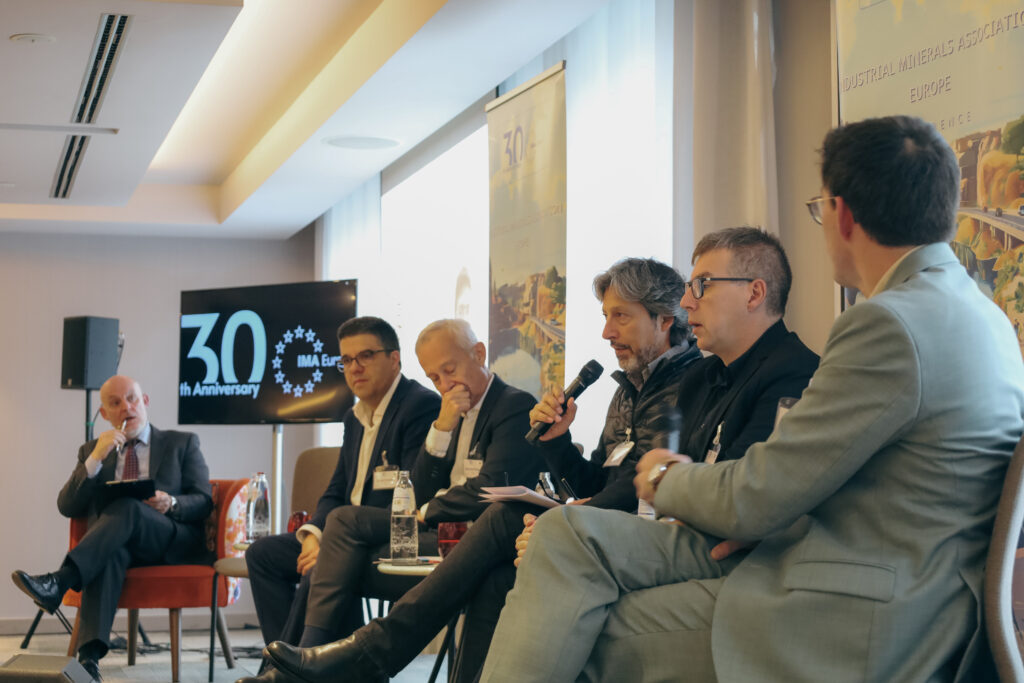
Speakers underscored that responsible sourcing is essential for building a sustainable mineral industry within EU and for EU. With frameworks that prioritise environmental stewardship and community well-being, responsible sourcing practices can drive long-term resilience and boost responsible sourcing across Europe’s mineral supply chains.
Key Messages
- Essential Minerals for Sustainable Development: Industrial minerals are indispensable to Europe’s infrastructure, energy systems, and technological advancements. By incorporating essential minerals, industries are empowered to innovate in ways that support Europe’s green and digital ambitions and support respective developments.
- Responsible Sourcing as a Pillar of Resilience: Responsible Sourcing is key to fostering a sustainable and resilient future. By committing to ethical practices, reducing environmental impact, and prioritizing community engagement, the industrial minerals sector can lead by example the path towards responsible, future-focused practices.
- Collaborative Approach to Sustainability: Cross-industry partnerships and collaborations with academic institutions and NGOs, both international and local, are crucial for creating lasting solutions to today’s environmental challenges.
The IMA Europe’s Conference made clear that through essential minerals and responsible sourcing, the industry can support Europe’s path to sustainability while meeting evolving industrial needs. These sessions underscored the commitment of the industrial minerals sector to responsible practices, providing a straightforward roadmap for the future of the industry aligned with Europe’s broader environmental goals and mineral being part of societal solutions.
High-level Roundtable:
The Industrial Minerals Europe Conference served as a platform for both the raw materials industry and civil society to voice concerns over the state of Europe’s industrial landscape, spotlighting several critical issues that set red tape for the sector’s stability and growth. Amid economic challenges and regulatory pressures, speakers and industry representatives stressed the need for proactive policy support to enable and not hinder—Europe’s raw materials and wide range of industrial sectors in achieving sustainable growth and resilience.
Below are the key takeaways from the discussions:
1. A Call for Policy as an Enabler
Mr. Hilmar Rode, CEO of Sibelco highlighted the depth of the current downturn, pointing out that it’s not simply a cyclical setback but a deeper, more systemic challenge affecting the entire European industry, including raw materials. Mr. Rode emphasized the need for regulatory frameworks that empower industries rather than obstruct them, warning that without regulatory adjustments, Europe’s industrial competitiveness will continue to erode and industries will continue to desert EU and follow their markets. His message was clear: for Europe to sustain a resilient industry, regulatory support must adapt to current realities.
2. Investment Gaps Threatening Decarbonisation Goals
Ms.Isabelle Barthes, Deputy Secretary General of industriAll Europe, raised an urgent issue—the rise in plant closures and cutbacks, a troubling trend even within sectors geared toward green energy. According to Barthes, Europe’s ambitious decarbonisation goals are stalling due to inadequate investment, exacerbated by global trade distortions. She cautioned that without robust financial backing, Europe’s industries risk losing ground to international competitors, particularly in sectors critical to the green transition. These threats will be heavy on the employees of these sectors moving out of EU.
3. Competitiveness as a Prerequisite for a Sustainable Future
Mr.Heimo Scheuch, CEO of Wienerberger, highlighted the fact that every company leaving EU is not coming back. He stressed the importance of maintaining Europe’s competitiveness on the global stage, particularly for export-reliant sectors. He urged Brussels to reinforce its commitment to supporting entrepreneurs and businesses that drive Europe’s economy forward. For Mr.Scheuch, competitiveness isn’t just about profits; it’s essential for ensuring Europe’s ability to lead in resilient practices and economic developments. Question is: Should we really remain in the victim position, or we are going to take responsibility and drive the change?!
4. Building a Union for Industrial Investment
Ms.Alva Finn from the European Liberal Forum argued that the European Union’s cohesion policy should be reoriented to prioritise industrial value chains. Ms.Finn highlighted the need for a Capital Markets Union as a means to unlock essential investments that could bridge gaps between regional economies and bolster industrial stability. For Ms.Finn, a Capital Markets Union represents a strategic opportunity for governments and industries alike to invest in Europe’s industrial base and ensure long-term growth.
5. Enhancing Communication with Civil Society
Mr. Roger Doome, Director General of IMA-Europe, underscored the need for the industrial minerals sector to strengthen its dialogue with civil society. With industrial minerals essential to daily life and the economy, Mr. Doome argued that better communication is necessary to highlight the sector’s contributions and existing misconceptions. Mr. Doome’s remarks also included a call for policymakers to reduce red tape and address Europe’s high energy costs, which collectively burden the industry’s efforts to decarbonise while remaining globally competitive. He issued a stark warning: without meaningful legislative changes in Brussels, the sector faces a risk of genuine decline.
Key Messages for Policymakers and Industry Leaders
- Enabling Regulation Is Vital for Industrial Resilience: Regulations should be designed to support industrial sectors in achieving sustainability, not as barriers that restrict growth and innovation. A balance between regulation and industry needs is crucial to maintaining Europe’s economic and competitiveness objectives aligned. Mineral companies produce goods and services for society. Avoid red tape and minimize the burden of reporting.
- Investment is a Decarbonisation are Imperative but without Competitive Industry it will result in Deindustrialization: To meet Europe’s ambitious sustainability goals, substantial and sustained investments are required. Europe cannot afford to let its decarbonisation agenda go against industry competitiveness. No green transition without competitive industries.
- Strengthening Europe’s Global Competitiveness: Supporting European industry’s competitiveness is essential to foster resilience, maintain market leadership, and pursue sustainability objectives. Europe must leverage its market strength to set global standards rather than risk falling behind.
- The Power of Cohesion and Collaboration: A Capital Markets Union and a cohesive industrial policy are needed to empower Europe’s industries, bridging regional economic disparities and ensuring that industrial value chains remain robust and competitive.
- Bridging the Gap with Civil Society: Strengthening communication with civil society is essential to emphasize the industrial minerals sector’s role in everyday life and sustainable practices. Building public awareness can support more informed, effective policy-making decisions that aligns with industry needs and societal expectations.


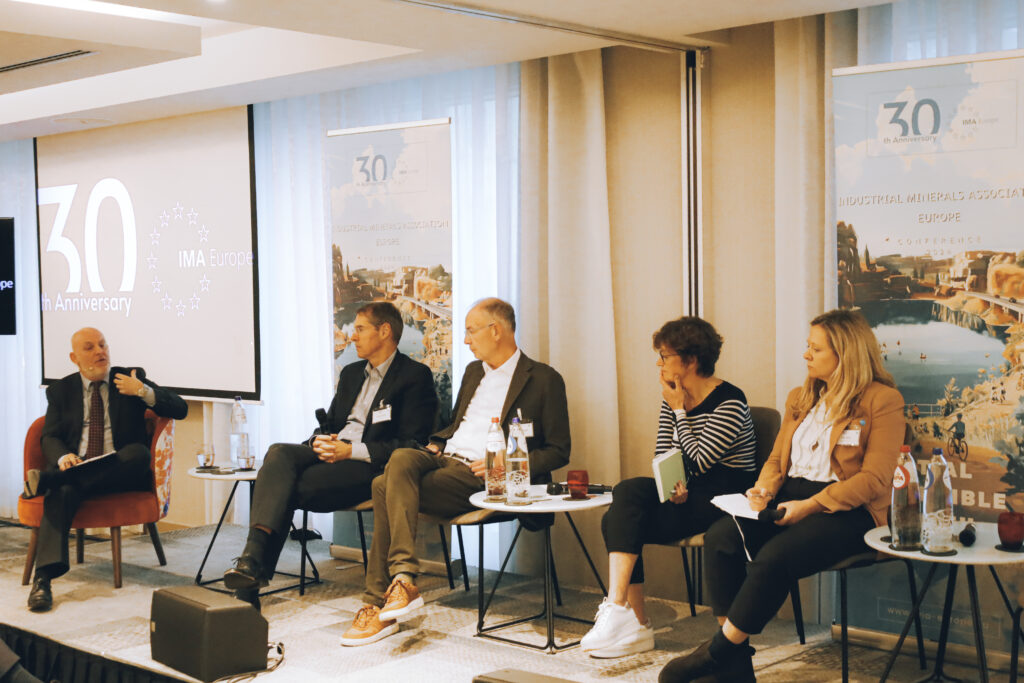

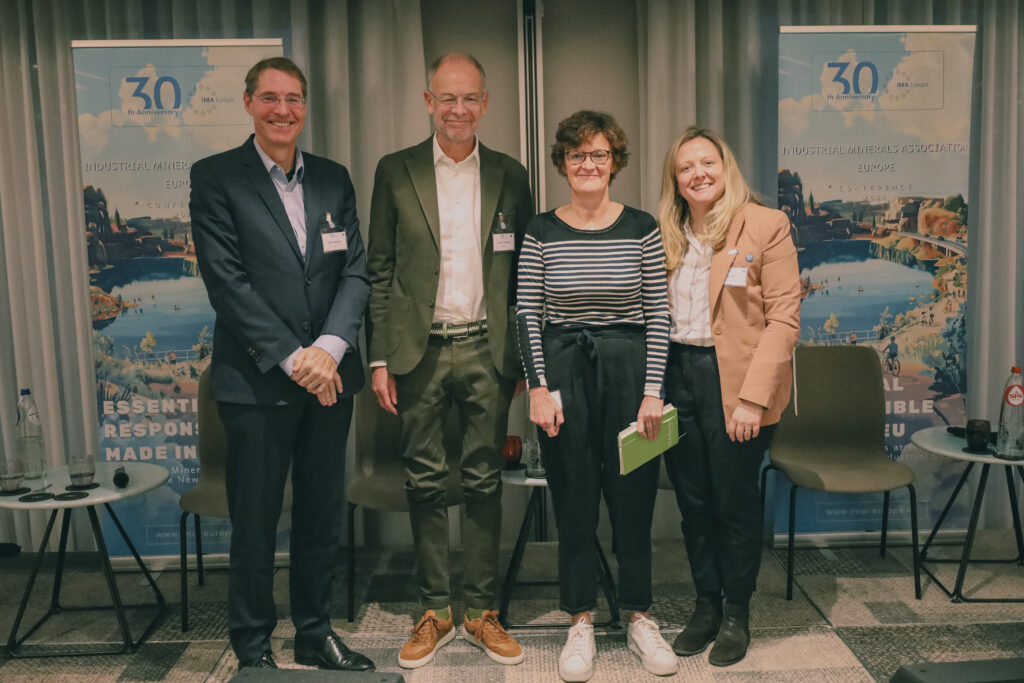
The Industrial Minerals Europe Conference in addition to celebrating its 30th anniversary has launched a call to action for both industry stakeholders and policymakers. For Europe to maintain a strong and sustainable industrial foundation, the raw materials sector needs supportive policies, investment, and an open dialogue with civil society. The conference underscored that the path forward requires a unified, collaborative effort to ensure the industrial minerals sector’s contributions to a sustainable European economy are recognised, valued, and supported. We need all of this to make Europe resilient, prosperous and future-oriented.
Find a recap of IMA-Europe Conference 2024 through cartoons made during live sessions here.

Conference 2024 Photo gallery:
